#which i will draw the details of at a later point like when i actually get there
Explore tagged Tumblr posts
Text
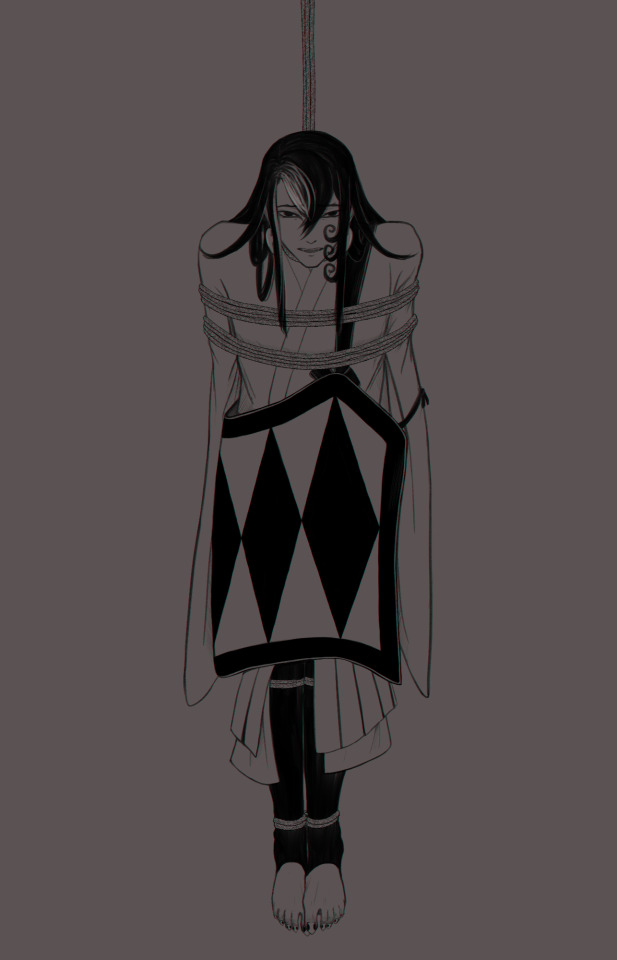

So, about Douman's beheading scene in Abe no Seimei Monogatari...
#fgo#fate grand order#Ashiya Douman#decapitation#gore#ask to tag#half fate half abe no seimei monogatari fanart?#i was into it LOL so i had to draw before getting back to my planned art#i knew hakudou brings seimei back from the dead and then he kills him i did not realize he would be bound#they. they specify takate kote for his arms#which i will draw the details of at a later point like when i actually get there#i was looking ahead because of annotation in the scene where seimei comes back drunk and douman is going to kill him#went with a look closer to pre exile cause he's still in the capital at the time#sometimes you gotta draw your fav's really hot beheading scene. yeah
22 notes
·
View notes
Text
FYI artists and writers: some info regarding tumblr's new "third-party sharing" (aka selling your content to OpenAI and Midjourney)
You may have already seen the post by @staff regarding third-party sharing and how to opt out. You may have also already seen various news articles discussing the matter.
But here's a little further clarity re some questions I had, and you may too. Caveat: Not all of this is on official tumblr pages, so it's possible things may change.
(1) "I heard they already have access to my data and it doesn't really matter if I opt out"
From the 404 article:
A new FAQ section we reviewed is titled “What happens when you opt out?” states “If you opt out from the start, we will block crawlers from accessing your content by adding your site on a disallowed list. If you change your mind later, we also plan to update any partners about people who newly opt-out and ask that their content be removed from past sources and future training.”
So please, go click that opt-out button.
(2) Some future user: "I've been away from tumblr for months, and I just heard about all this. I didn't opt out before, so does it make a difference anymore?"
Another internal document shows that, on February 23, an employee asked in a staff-only thread, “Do we have assurances that if a user opts out of their data being shared with third parties that our existing data partners will be notified of such a change and remove their data?” Andrew Spittle, Automattic’s head of AI replied: “We will notify existing partners on a regular basis about anyone who's opted out since the last time we provided a list. I want this to be an ongoing process where we regularly advocate for past content to be excluded based on current preferences. We will ask that content be deleted and removed from any future training runs. I believe partners will honor this based on our conversations with them to this point. I don't think they gain much overall by retaining it.”
It should make a difference! Go click that button.
(3) "I opted out, but my art posts have been reblogged by so many people, and I don't know if they all opted out. What does that mean for my stuff?"
This answer is actually on the support page for the toggle:
This option will prevent your blog's content, even when reblogged, from being shared with our licensed network of content and research partners, including those that train AI models.
And some further clarification by the COO and a product manager:
zingring: A couple people from work have reached out to let me know that yes, it applies to reblogs of "don't scrape" content. If you opt out, your content is opted out, even in reblog form. cyle: yep, for reblogs, we're taking it so far as "if anybody in the reblog trail has opted out, all of the content in that reblog will be opted out", when a reblog could be scraped/shared.
So not only your reblogged posts, but anyone who contributed in a reblog (such as posts where someone has been inspired to draw fanart of the OP) will presumably be protected by your opt-out. (A good reason to opt out even if you yourself are not a creator.)
Furthermore, if you the OP were offline and didn't know about the opt-out, if someone contributed to a reblog and they are opted out, then your original work is also protected. (Which makes it very tempting to contribute "scrapeable content" now whenever I reblog from an abandoned/disused blog...)
(4) "What about deleted blogs? They can't opt out!"
I was told by someone (not official) that he read "deleted blogs are all opted-out by default". However, he didn't recall the source, and I can't find it, so I can't guarantee that info. If I get more details - like if/when tumblr puts up that FAQ as reported in the 404 article - I will add it here as soon as I can.
Edit, tumblr has updated their help page for the option to opt-out of third-party sharing! It now states:
The content which will not be shared with our licensed network of content and research partners, including those that train AI models, includes: • Posts and reblogs of posts from blogs who have enabled the "Prevent third-party sharing" option. • Posts and reblogs of posts from deleted blogs. • Posts and reblogs of posts from password-protected blogs. • Posts and reblogs of posts from explicit blogs. • Posts and reblogs of posts from suspended/deactivated blogs. • Private posts. • Drafts. • Messages. • Asks and submissions which have not been publicly posted. • Post+ subscriber-only posts. • Explicit posts.
So no need to worry about your old deleted blogs that still have reblogs floating around. *\o/*
But for your existing blogs, please use the opt out option. And a reminder of how to opt out, under the cut:
The opt-out toggle is in Blog Settings, and please note you need to do it for each one of your blogs / sideblogs.
On dashboard, the toggle is at https://www.tumblr.com/settings/blog/blogname [replace "blogname" as applicable] down by Visibility:

For mobile, you need the most recent update of the app. (Android version 33.4.1.100, iOs version 33.4.) Then go to your blog tab (the little person icon), and then the gear icon for Settings, then click Visibility.
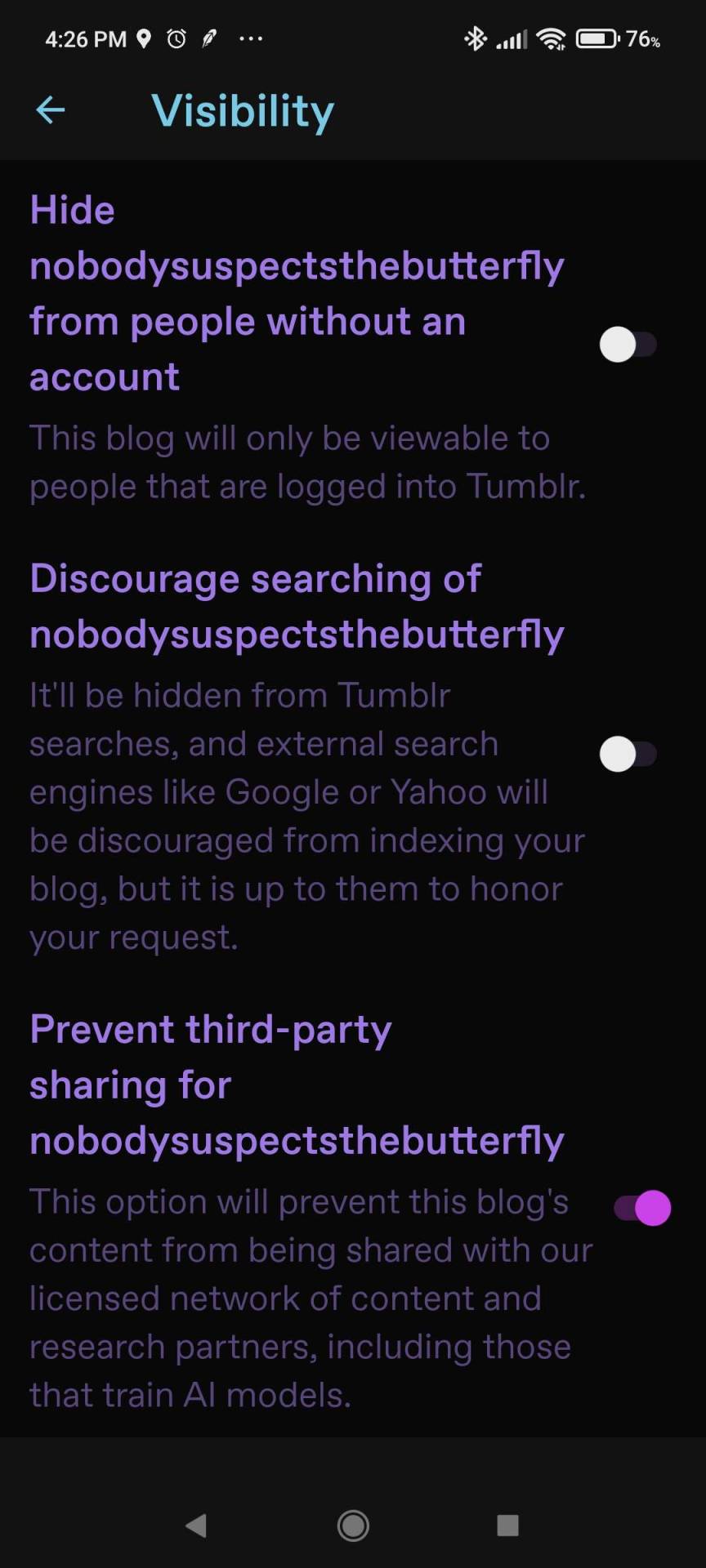
Again, if you have a sideblog, go back to the blog tab, switch to it, and go to settings again. Repeat as necessary.
If you do not have access to the newest version of the app for whatever reason, you can also log into tumblr in your mobile browser. Same URL as per desktop above, same location.
Note you do not need to change settings in both desktop and the app, just one is fine.
I hope this helps!
#tumblr#[tumblr]#third party sharing#openai#midjourney#chatgpt#ai art#ai#fyi#psa#anti-FUD#artists on tumblr#writers on tumblr#illustrators on tumblr#tumblr update#oh tumblr#hellsite (derogatory)#“opt out” no longer looks like a word#but still#opt out my friends#please#also if you want to leave tumblr i don't blame you but please remember to hit that opt-out button before you go
4K notes
·
View notes
Note
hi im so in love with your writing! I was wondering if I could request an angsty remus fic? maybe with an unrequited love theme where reader has a massive crush on him but he notices and rejects reader before they can even confess? its not that’s ok! mwah tyy <33
Unrequited Love

Remus Lupin x f!reader
Summary: It wasn’t just a crush. It was deeper, more desperate. Every day beside him was a mix of silent happiness and growing pain because, deep down, you knew he didn’t see you the same way. And yet, you clung to any shred of attention. A smile in the hallway or the sound of his name on your lips, which he always responded to with that infallible kindness. You knew you were drowning, but you couldn’t help it.
Warnings: angst
A/N: hi love, you are so kind, thank you so much for the sweet words. I hope I did something that meets your expectations - and gosh, maybe, just maybe I am a little devastated, it's two angsts in a row with my boy Remus (that said, of course I loved doing it)
Masterlist | part II

You couldn’t quite remember exactly when it all started, but at some point between shared classes and comfortable silences in the library, Remus Lupin started occupying every thought of yours. Maybe it was that afternoon, weeks ago, when he noticed you were struggling to understand the theory behind a complicated spell. He approached, gentle but not invading your space, and said: "Can I help? I think I have an easier way to explain this."
You accepted, of course, your face warm and words stuck in your throat. He sat beside you, his voice low and firm as he pointed to the lines of the book with a slender finger. Every time he explained something, he’d end it with a quick glance, as if he wanted to confirm you were following along. You were so captivated by the sound of his voice that the actual understanding of the spell came later, when you were alone.
That’s when you started noticing the details. The way he furrowed his brow when reading something particularly complicated, or how he smiled to the side, a subtle smile, but enough to light up your whole day. He was different. He didn’t draw attention like his friends, who were usually the center of any room, but there was something in the restrained gestures, the care in his words, that made him seem more... real.
You began seeking opportunities to be near him. Not that it was intentional at first, but you always seemed to end up at the table next to him in the library or choosing the same time to study in the empty classroom. He never seemed to mind. In fact, he always nodded or gave a polite "good afternoon" before returning to what he was doing.
There was that day, though, that stayed engraved in your mind with almost painful clarity. It was an ordinary afternoon, and you were in the library. You had mentioned, without thinking, that you loved chamomile tea because your mother used to say it had a "comforting taste." He chuckled softly, a sound that made your heart stumble in your chest. A few weeks later, while you were sitting in a class, he casually leaned in and murmured: "Did you know chamomile tea was used in Ancient Greece as medicine? Seems fitting, doesn’t it?"
Your head spun to him, surprised. He remembered. It was just a silly sentence you had said, but he remembered. The rest of the class passed in a blur as you replayed each word, each glance.
It wasn’t just a crush. It was deeper, more desperate. He seemed to carry the weight of the world on his shoulders, but you wanted so much to be the one who could ease some of that. Every day beside him was a mix of silent happiness and growing pain because, deep down, you knew he didn’t see you the same way.
And yet, you clung to any shred of attention. A smile in the hallway, a "Are you okay?" after a tough test, or the sound of his name on your lips, which he always responded to with that infallible kindness.
You knew you were drowning, but you couldn’t help it.

The weeks dragged on like a dream, but a dream that never became reality. With every encounter with Remus, you felt like you were floating, but there was always an invisible weight pulling you back to the ground. He was kind, considerate, but never crossed the line. Every gesture, every word, was filled with a cordiality that you desperately wanted to interpret as something more, but you couldn’t ignore the voice in your head whispering, "He's just being polite. It doesn’t mean anything."
It was in this tension that an idea formed. A letter. If you couldn’t say everything you felt to him in words, maybe you could put it on paper. You had already rehearsed so many times, in your mind, the perfect phrases, the declarations that could, perhaps, make him see you differently. But every time you opened your mouth, the words died before they took shape.
That night, sitting on your bed with the curtains closed around you, you held a piece of parchment. The quill trembled in your hand as you stared at the blank page. Your heart was pounding, a mix of anticipation and fear. What could you write that would capture everything you felt? How could you translate in words the impact he had on you, the way he made the world seem lighter just by being in it?
After minutes that felt like hours, you began:
"Remus, I know this might seem strange or unexpected, but I need to say something that I’ve kept to myself for so long that I can’t keep it in anymore. Since I met you, something inside me has changed. I don’t know if you’ve noticed, but there’s something in your gestures, in the way you look at the world, that makes me want to be a part of it. You’re more than kind; you’re someone who makes everything seem... possible. I don’t know how to put it any other way, so I’ll be direct: I like you. More than as a friend. And I needed to tell you. Because holding this in is starting to hurt more than having the courage to say it."
You stopped, looking at the words you had just written. Your breath was heavy, and silent tears threatened to fall. It was a relief, in a way, to see it all there on paper. But the weight of what could happen next was almost unbearable.
For a moment, you considered handing him the letter. Not that night, of course, but maybe the next morning, or during the next class. The idea gave you a spark of hope, but also brought an overwhelming fear.
What if he didn’t feel the same?
That question echoed in your mind, over and over, as you carefully folded the letter and hid it in the pocket of your coat. Your hand stayed there, feeling the weight of the parchment like a bomb about to explode.

Remus knew. He had known for some time. There was no way he couldn’t notice.
There was something in the way you looked at him, a hesitant and hopeful gleam, that didn’t go unnoticed. He noticed the moments when you got closer than necessary, like when you sat beside him in the library even when there were empty tables. He noticed how you seemed to hold your breath whenever he leaned in to explain something, or how your words sometimes faltered, as if the weight of something unspoken was too much.
He wasn’t a fool. The subtleties of the heart, however, were a territory he preferred to avoid. Especially when he knew he couldn’t return the feelings.
You were smart, dedicated, kind in a way that made people want to be near you, and you were beautiful. He genuinely liked your company, but not in that way. Not the way you seemed to desire. Remus felt a tightness in his chest every time this reality pressed upon him, because he knew what needed to be done. He knew that the longer he let things drag on, the worse it would be for you.
That’s why, after Potions class that afternoon, he waited for you to finish gathering your things. He didn’t know exactly what he would say, but the words had been weighing on his throat for days.
“Do you have a minute?” His voice was calm, but there was something in his expression, the way he avoided eye contact for a second longer than usual, that made your heart stop.
“Of course.” Your response was automatic, but the nervousness crept into your voice. He was serious, more serious than you’d ever seen him before, and that sent a chill through your stomach.
As you walked beside him, the hallways seemed longer, quieter. You noticed he didn’t look directly at you, and that only made the nervousness grow.
He stopped next to an empty window, where the late afternoon light fell in soft angles. You held your books to your chest, as if they were armor, while he finally turned to face you.
“I... I think we need to talk.”
Your heart seemed to beat too fast, as if trying to prepare itself for whatever might come out of his mouth. You knew he wouldn’t say this lightly. “We need to talk” was never a casual introduction, it never preceded something good. Still, you tried to hold on to the faint hope, that quiet voice in the back of your mind whispering: Maybe he feels something too. Maybe he wants to say he noticed...
“I... I need to be honest with you,” Remus began, his voice low and serious, his words carefully chosen, but they still fell like stones upon you. “I don’t think it would be fair to let this continue without saying anything.”
Your fingers tightened around your books against your chest. Without saying what? Anxiety ran like fire through your veins, and you couldn’t look away from him, even though part of you wanted to run.
“I’ve noticed that...” He paused, biting his lower lip slightly, as if the words were hard to form. He ran a hand through his hair nervously, looking away for a brief moment before meeting your eyes again. “You’ve been... very kind to me, and I appreciate that. Truly. But I... I don’t want you to think that... there’s something here that isn’t.”
The world seemed to silence around you. Only his words echoed in your mind: “Something that isn’t.” It was as if he had ripped the ground out from under you with a single sentence.
“I don’t understand.” Your voice came out quieter than you expected, almost a whisper. You knew what he was trying to say, but at the same time, you refused to believe it. It couldn’t be this. It couldn’t end like this.
“I don’t want to hurt you.” He took a step closer, his gaze filled with something that seemed like guilt. “But I think you feel something for me. Something more than friendship.”
You felt your face burn, your chest tightening as if being compressed by an impossible weight. He knew. All this time, he knew.
“I...” You tried to deny it, tried to find some word that could save you from the abyss opening up, but your voice failed.
“You don’t have to say anything,” he interrupted, his voice softer now, but somehow, that only made it hurt more. “I just... I don’t want you to get hurt. You’re amazing. You’re kind, you’re smart, and anyone would be lucky to have your attention.” He sighed, his shoulders dropping slightly, as if the weight of the situation affected him too. “But I’m not that person. I can’t... see you that way.”
It was as if he had pulled the air from your lungs. Every word felt like a blade, cutting slowly but deeply. You felt tears burning in your eyes, but you refused to let them fall. Not in front of him.
“You’re saying that...” You stopped, swallowing hard, your throat too tight to continue.
“I don’t want you to have hopes where there’s no space for them,” he said softly, as if trying to minimize the impact, but the pain was already there, overwhelming and absolute.
You didn’t know what to say, how to respond. All you could feel was the crushing rejection, the weight of knowing he would never look at you the same way. It was worse than you had imagined, because he wasn’t being cruel. He was being honest, and his honesty hurt more than any cruelty ever could.
“I’m so sorry,” he said, almost in a whisper, and those words were the final stone that fell upon your heart already in ruins.
You nodded quickly, unable to trust your own voice, and took a step back. You wanted to say something, wanted to pretend you were fine, but there was nothing that could be said. So, you just turned and left, feeling his eyes on your back but not looking back.
The first tear fell before you even turned the corner.
Each step echoed like a drum in your ears, blending with the disordered sound of your thoughts. You pressed the books to your chest so tightly that your fingers began to ache, but it was better to focus on the physical pain than the agony that was boiling inside you.
The students around you laughed, talked, ran. The castle was alive, pulsing with the energy of carefree teenagers, but everything felt muffled, distant, as if you were walking through a bad dream.
You turned down a random hallway, not even knowing where you were going, just needing to get away from everything and everyone. Your heart pounded in your chest, and the knot in your throat seemed to tighten with every passing moment, as if it were impossible to swallow the weight that kept building there.
Finally, you found an empty corner, behind a worn tapestry that no one seemed to notice. It was a temporary hiding spot, but it was all you needed. You threw yourself against the cold wall, sliding to the floor, the books falling from your hands as the tears you had held back for so long finally overflowed.
They came hot and relentless, streaming down your face mercilessly. You tried to stifle the sobs, biting your fist, but it was useless. The pain felt like its own entity, growing and spreading inside you.
Your chest ached, a physical sensation of emptiness and tightness that almost made you gasp for air. Your hands trembled, gripping your knees as if they were your only anchor. He knew. Those words echoed repeatedly in your mind. He had known all along.
Worse yet, not only did he know, but he had decided to tell you in such a careful, gentle way that the rejection became even more painful. He hadn't looked down on you, hadn't mocked you, but that only made it crueler. He had looked directly at you and said, without hesitation, that there was no space for you in his heart.
You closed your eyes, trying to breathe deeply, but all you could see was his face. The calm expression, the soft tone. The contrast between his kindness and the brutality of what he was saying was unbearable.
What had you done wrong? The question burned like fire, consuming everything around you. You replayed every interaction, every glance, every word spoken. There was no way to erase the moments when your heart raced for something he said or did. There was no way to turn back time and rip the feelings from yourself that you knew he would never return.
In the distance, you could hear other students passing by, carefree voices, laughter filling the hallways. Life continued as if nothing had happened, as if your world hadn't ended in that moment. The contrast was suffocating, a reminder that your pain was yours alone.
You hugged your knees, trying to diminish the feeling of falling apart. All you wanted was to disappear, to become invisible. Maybe, if no one saw you, no one would know how broken you were.

Time seemed to drag on, but it also slipped through your fingers like sand. You couldn’t tell how much time had passed since that conversation. Days? Weeks? Every unavoidable encounter with him felt like tearing the scab off a wound that hadn't even started to heal.
Classes became a kind of silent torture. He was always there, just a few meters away, and you could feel his presence like an electric current pulsing in the air. Sometimes, your eyes would meet for a brief moment, and he’d smile hesitantly, almost as if he were trying to offer some form of comfort.
But there was no comfort to be found.
You started changing seats in classes, picking places farther away. You walked through the hallways with your eyes on the floor, avoiding any chance of crossing paths with him. When he was with James or Sirius, laughing and talking loudly, you found some excuse to leave. Seeing that smile, hearing that laugh, felt like a cruel reminder that his life was going on without interruption while yours was in ruins.
You knew he noticed. Remus Lupin was perceptive, perhaps more than anyone you knew. And that’s why, on an ordinary afternoon, he came over.
The hallway was empty, and you were organizing the books in your bag with slightly trembling hands. When his shadow fell over you, your stomach tightened instinctively.
“Hey,” he began, his voice low and cautious, as if he were walking on glass. “Can I talk to you?”
You didn’t want to. You wanted to turn and run, wanted to scream for him to leave you alone. But instead, you just nodded, because running now seemed useless.
He hesitated for a moment before continuing. “I... noticed you’ve been avoiding me.” He ran a hand through his hair, a habit you knew all too well. “I don’t want things to be like this between us.”
The bitter laugh almost escaped your lips, but you swallowed it. “Like what?” Your voice came out harsher than you intended, but your heart was pounding so hard that it was hard to control.
“Distant.” He took a step closer, but stopped when he saw you recoil, even if it was just a little. “I... hope we’re still friends.”
The word pierced like a sharp blade. Friends. Of course. That was what he wanted from you. What he always wanted. And hearing it, said so gently and sincerely, made it hurt even more.
You wrapped your arms around your body as if that could contain the emptiness spreading inside you. “Friends,” you repeated, testing the word on your lips. It felt strange, bitter, as if it didn’t belong there.
“Yes.” He gave a small, hopeful smile. “I really... I’m so sorry, you know? For everything. I never meant for you to feel like this.”
“I know.” Your response was barely audible. You knew he didn’t want to hurt you. That made it all worse.
There was an uncomfortable silence between you. He seemed to be waiting for something, maybe a confirmation that everything was okay. But you couldn’t give him that. Not now.
“I... I need to go,” you finally said, your voice trembling as you slung the bag over your shoulder.
“Of course,” he replied, a little hurriedly. “But... we’re okay, right? I just want you to know, if you need me, I’m here.”
You closed your eyes for a brief moment, trying to breathe, trying to stop the pain from overflowing once more. When you opened them, you forced a small smile that didn’t reach your eyes. “I’m fine, Remus. Thank you.”
Before he could respond, you turned and walked quickly, feeling the tears threatening to fall.
As you turned the corner, you leaned against the wall for a moment, your eyes burning and your breath heavy. He wasn’t cruel. He would never be. And maybe that was exactly what made it all so unbearable.

Night had fallen over Hogwarts, and the castle was immersed in a heavy silence. You were in the farthest corner of the common room, where no one seemed to notice your presence. The only company was the fireplace, its flames flickering irregularly, casting shadows that danced across the walls.
In your hands, the letter you wrote weeks ago trembled slightly. The parchment was crumpled and worn at the edges, as if it had been handled countless times but never read by anyone other than you.
You remembered exactly the moment when you wrote it, the words flowing like a confession from your heart. It was everything you wanted to say to him. All the feelings that had been growing, gaining strength and life of their own. You had poured out every thought, every heartbeat, with the naive hope that he might feel the same.
But now, all that remained was a useless piece of paper.
You smoothed the parchment carefully, your fingers tracing the words written in your hesitant handwriting. Each sentence seemed to mock you now, like a cruel reminder of everything you felt and everything that would never be returned.
The flame of the fireplace seemed to call to you, its warmth offering a final solution to the weight you carried. With a trembling sigh, you stood up, feeling your heart tighten in your chest.
You hesitated for a moment, the letter still firmly held in your hands. Part of you wanted to keep it, hold onto it as a reminder of something that once mattered. But another part of you knew you needed to let go, even if it meant releasing something you never truly had.
"I could never be enough for you, could I?" you whispered to no one, your voice barely above a thread.
Finally, you brought the parchment closer to the flame, and it began to burn slowly. The edges darkened and curled, the fire consuming the words that once seemed so important. You watched each line disappear, one after another, until all that remained was ash and embers.
The pain in your chest was unbearable, but you stood there, motionless, watching as the last particles of the letter were carried away by the wind from the fire. It felt like watching the end of something that never had the chance to begin.
You sat on the floor, pulling your knees to your chest, the tears finally falling freely. They burned, hot and relentless, as you wondered how it was possible to feel so much for someone who would never look at you the same way.
Despite everything, you knew you still loved him. That was the cruelest part of all. Even after all the pain, all the rejection, you couldn’t simply turn off your feelings. He was still the one who made your heart race, who inhabited your dreams, who carried the weight of your hopes and fears.
But he would never be yours.
#remus lupin fanfiction#remus lupin#remus j lupin#remus john lupin#remus john lupin fanfiction#remus x you#remus x reader#remus x y/n#no use of y/n#remus lupin x y/n#remus lupin x you#remus lupin x reader#marauders era#writers on tumblr#fanfiction#ao3 writer#writing#angst#unrequited love#moony#moony x reader#moony x you#f!reader#angst ending
432 notes
·
View notes
Text
Help! I'm A Private Person!
Neil Gaiman, Journal.NeilGaiman.com, 14 January 2025:
Over the past many months, I have watched the stories circulating the internet about me with horror and dismay. I’ve stayed quiet until now, both out of respect for the people who were sharing their stories and out of a desire not to draw even more attention to a lot of misinformation. I've always tried to be a private person, and felt increasingly that social media was the wrong place to talk about important personal matters. I've now reached the point where I feel that I should say something. As I read through this latest collection of accounts, there are moments I half-recognise and moments I don’t, descriptions of things that happened sitting beside things that emphatically did not happen. I’m far from a perfect person, but I have never engaged in non-consensual sexual activity with anyone. Ever. I went back to read the messages I exchanged with the women around and following the occasions that have subsequently been reported as being abusive. These messages read now as they did when I received them – of two people enjoying entirely consensual sexual relationships and wanting to see one another again. At the time I was in those relationships, they seemed positive and happy on both sides. And I also realise, looking through them, years later, that I could have and should have done so much better. I was emotionally unavailable while being sexually available, self-focused and not as thoughtful as I could or should have been. I was obviously careless with people's hearts and feelings, and that's something that I really, deeply regret. It was selfish of me. I was caught up in my own story and I ignored other people's. I’ve spent some months now taking a long, hard look at who I have been and how I have made people feel. Like most of us, I’m learning, and I'm trying to do the work needed, and I know that that's not an overnight process. I hope that with the help of good people, I'll continue to grow. I understand that not everyone will believe me or even care what I say but I’ll be doing the work anyway, for myself, my family and the people I love. I will be doing my very best to deserve their trust, as well as the trust of my readers. At the same time, as I reflect on my past – and as I re-review everything that actually happened as opposed to what is being alleged – I don't accept there was any abuse. To repeat, I have never engaged in non-consensual sexual activity with anyone. Some of the horrible stories now being told simply never happened, while others have been so distorted from what actually took place that they bear no relationship to reality. I am prepared to take responsibility for any missteps I made. I’m not willing to turn my back on the truth, and I can't accept being described as someone I am not, and cannot and will not admit to doing things I didn't do.
Dear Neil,
You, sir, are nothing other than fundamentally misunderstood — indicated in every sense by this, a smart and good post that you published on the whole-ass internet for literally the entire world to read.
The important thing is that you're learning! And you deserve infinite credit for that. Not nearly enough people appreciate how much you've learned about yourself in the course of ~ allegedly ~ committing sexual assault against multiple, probably crazy, women and the aftermath thereof. Less enlightened men would disregard the experiences of women who have highly specific and detailed accounts of being sexually abused, but you are open to the idea that the women who foolishly believe you assaulted them were simply mislead by your interminable charm! For which you cannot be held responsible! What a gift you are, friend; your generosity and open-mindedness are unparalleled.
Truly, whomst among us has not been where you find yourself now? Come, enjoy the company of friends who understand the brutal loneliness that results from being misunderstood by hysterical bitches who fail to appreciate the privilege of having your masterful fingers shoved up their asses without notice!
Again and again, women love men like you too much. They want you to be emotionally and sexually available! And that is just so, so much to ask. You have a lot going on! It's not a ding on them — of course they find you irresistible, being as you are an intellectual titan — and they may find themselves confused and intimidated by your sexual prowess, unaware that you exist in a world beyond pedestrian notions of consent. That is what makes your work so particularly meaningful and powerful.
You write about a man who does a bad thing, but you do the other good thing! You do a good thing, but in your work, a man does a bad thing! This is the stuff of sheer brilliance, capturing the sturm unt drang of the human condition — or, at least, of the humans whose conditions matter most, which is to say, men of your creative stature.
The sorry truth is that despite your best efforts, no one understands you, the author of 40-plus years of written work in which you had every fucking opportunity to emulate literally any character of your design who was not an unrepentant rapist. Whomst among us has not struggled with such quandaries? Whomst among us has not wondered: Should I rape women in the presence of my child, or should I just the fuck wait a minute and destroy my marriage by other means? Should I order a cinnamon bagel, or an egg sandwich? These are the questions men such as us must grapple with in a world where cancel culture has run rampant, and where people are liable to believe anything they hear from over half a dozen unbridled harpies (story idea! make sure Katee Robert doesn't see this, she seems like a bitch with designs) whose indeterminate fantasies have been aggressively fact-checked by risk-averse media legal departments.
You're right and everyone else is wrong, and that's exactly the take-away that everyone will have from reading this thing that you posted! Great work, great instincts, great writing. It's like Stardust, but hotter. You know what I mean.
A+ all around, no notes other than: you should share this with more people directly so they have the clearest possible idea of where you're coming from. Don't hold back, bud!
#advice#bad advice#neil gaiman#stardust#good omens#katee robert#this mf#honestly fuck this man#leave him#dtmfa
337 notes
·
View notes
Text
Dungeon Meshi episode 21, being heavily dialogue-driven, was pretty straightforward animation-wise and let Ryoko Kui's stunning art speak for itself for the most part, but that doesn't mean that there aren't still some GENERALLY-INSIGNIFICANT-DETAILS-TO-SCRUTINIZE-AT-ARGUABLY-UNNECESSARY-LENGTH.
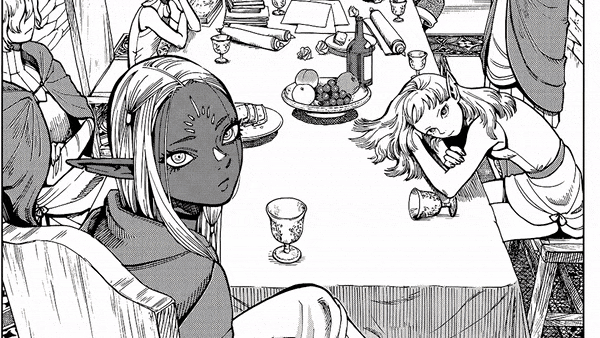
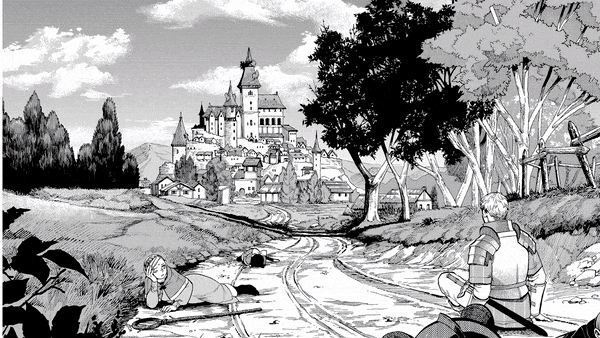
There was a strong emphasis on hands in this episode, particularly the second half, starting with this cut of Laios resting his on the Minotaur's snout.
The animators have taken this simple little panel (on the right) from the manga (btw, people who know more about this than I do, is there a name for this type of panel, which in film would be called an "insert shot"?)
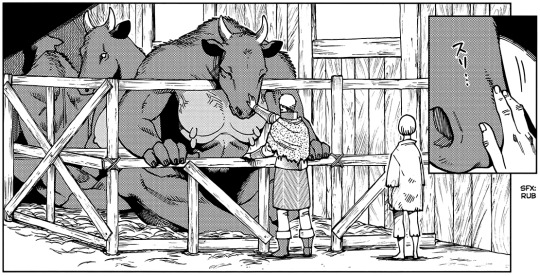
and turned it into this highly detailed tracking shot that heightens the emotional impact of this moment for Laios. It feels very similar to the shot of Kabru bringing a piece of fish to his mouth that introduced him to the series!
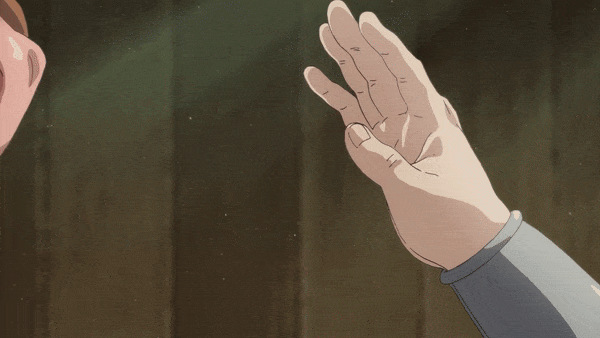

The theme comes up again when Laios does a little bit of blair-witching in the corner after being rejected by house-kitty-pilled Izutsumi,

and once again a few seconds later with this added close-up of Marcille's hand when she tries to read the magical aura of the area.
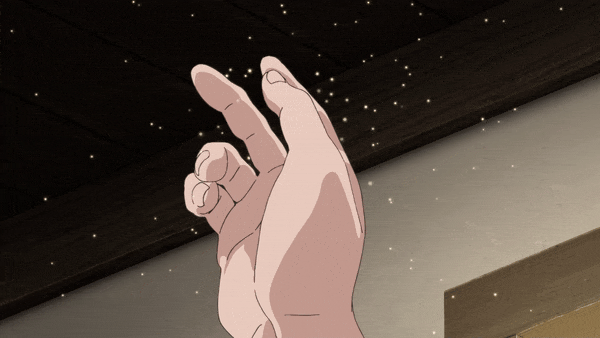
This one clearly makes heavy use of reference footage, to the point that it almost looks rotoscoped until you notice little details like this line that warps unrealistically at the heel of her palm.
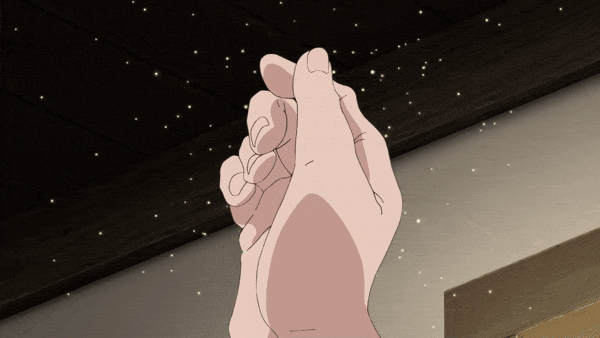
But with smooth, realistic motion like this, little details like that are much less important than the overall feeling of authentic shape and movement. This can be seen in a lot of Masaaki Yuasa's work, which often favors consistent motion and more frames over super polished individual drawings. Here's a thematically appropriate cut from Ping Pong for example:
(This one might actually be rotoscoped, I'm not sure)
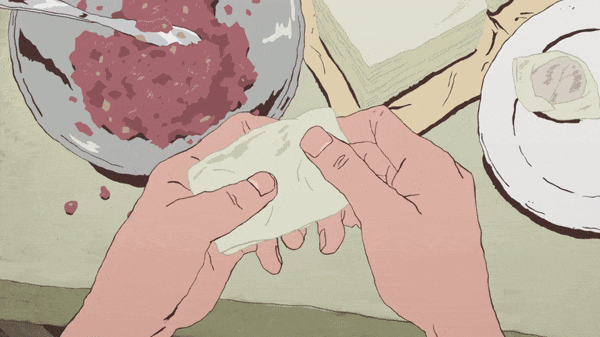
If you pause on any individual frame, the lines look wobbly and inconsistent, but it comes together as a whole to create something that feels authentic - real.
The heavy detail in the hand anatomy and the way the skin wrinkles around the knuckles in these cuts feels like a hard departure from Studio TRIGGER's signature heavy stylization, but these realistic cuts have popped up here and there since the start of this show, and I think they fit Dungeon Meshi really well! It can be jarring go straight from wacky bombastic cartoonsmanship to realism, but while it is a show about the hungriest hungriest himbo and his family of weirdos, it's also simultaneously a show about anatomy, ecology, and the horrors of the human mindbrain.
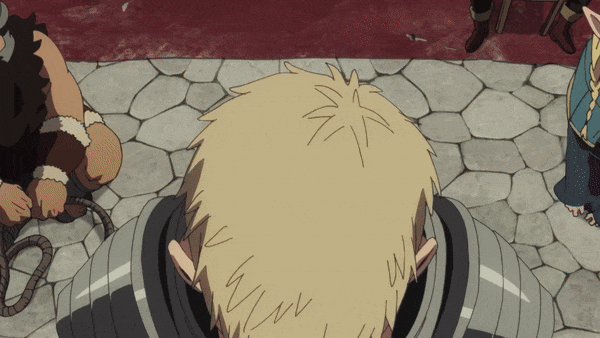
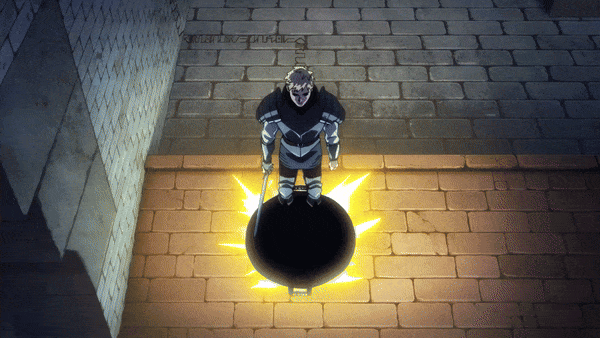
This was expanded from an excerpt from this video where I break down the whole episode, so if you want to continue wallowing in the sludge with me, consider checking out the video!
Thanks for reading.
youtube
#I feel like whenever I take an excerpt from my video scripts to turn into a post on here it ends up more fleshed out and over all better#because I have more time to think about it but also because I know some people on youtube will get mad if I talk about hands for 10 min XD#dungeon meshi#animation analysis#laios touden#marcille donato#mini essay#youtube#video#original#Youtube
659 notes
·
View notes
Text
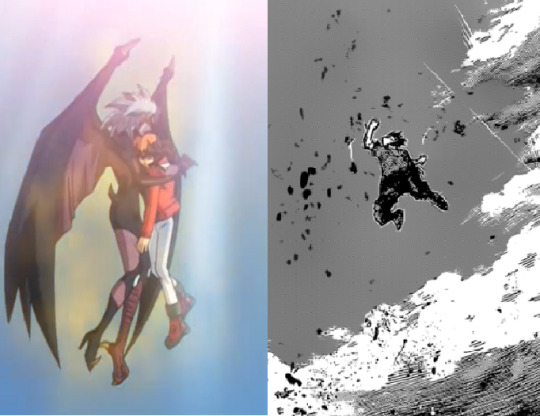
SHIGARAKI VS. YUBEL: HOW TO SAVE YOUR VILLAIN
The failure of Deku to save Shigaraki isn’t just a tragic conclusion for Shigaraki’s arc, it’s also My Hero Academia failing as a story. When I say the story failed, I mean the story has failed to answer any of the questions it asked its audience. It’s themes, character arcs, everything that communicates the meaning of the story to the audience is no longer clear.
Saving Shigaraki was the central goal of not only the story itself, but the main character Deku. By failing in its goal you can’t call this a good ending. In order to illustrate why this goal of saving the villain is so important to both Deku’s character and the central idea of MHA, I’m going to provide a positive example in Yu-Gi-Oh GX were the main character Judai successfully saves their villain. One of these stories fails, and the other succeeds. I will illustrate why under the cut.
BROKEN THEMES = BROKEN STORY
When artists draw they have to consider things like perspective, anatomy, shading, light, coloring. Drawing has rules, and it’s hard to produce good art without knowing these rules beforehand. If I draw something that has bad anatomy, you can criticize me for that.
Writing has rules, just like drawing. The rules of storytelling are important because writing is an act of communication. You can write whatever you want, just like how you can draw whatever you want, but if you break the rules the audience won’t understand what you are trying to communicate.
When I refer to MHA as a broken story, I am referring to the fact that it has broken the rules of storytelling. As this youtuber explains.
“I guess we should first define what broke and broken even means in this context. Has the story turned into an unintelligible mess? Not really. Value judgements aside, the narrative is still functional and fulfills the criteria of being a story. So how can a story that still functions be broken? Maybe to you it cannot. But to me a story that is still functional isn’t enough. What I mean when I say MHA is broken is that it’s lost something crucial. A codifying style of structure, pacing and payoff that until a certain point was the core of its identity.”
I could launch into a long-winded explanation of what themes are, but for the sake of simplicity I like to define themes in terms of “Ask, and answer.” The author asks a question to the audience, and then by the end of the story provides an answer. The audience is also invited to come up with their own answer which prompts them to think about the story on a deeper level. The question both MHA and GX are asking both its main characters and the audience is “Can you save the villain?” with the additional complicated question of “Should you save the villain?” This post will detail how both stories go about answering those two questions, and more importantly why those answers matter for the story.
With Great Power… You know the rest.
My Hero Academia and Yu-Gi-Oh Gx are actually similar stories once you get past their superficial differences. MHA is a story with way better worldbuilding, compared to a society where everything revolves around the trading card game, and people go to school to be better at a trading card game.
However, if you get past that. They are both bildungsroman, stories about the main characters growing up into adults. They both have an academy setting where the goal is for the main character to graduate and enter the adult world. They are both shonen manga. GX is the sequel of Yu-Gi-Oh a manga that ran in Shonen Jump the exact same magazine as MHA. The biggest point of comparison is their main characters, who both start out as young and naive who are driven by their admiration of heroes. Deku is a fan of All Might who wants to become a hero despite not having a quirk, because he loves All might who saves everyone with a smile. Judai’s entire deck archetype revolves around “Elemental Heroes’ and later “Neo-Spacians” who are all based on popular sentai heroes like ultraman.
The central arc for both characters is to grow up. Growing up for both of them not only requires figuring out what kind of adult they want to be, but also what kind of hero they want to be.
Now I’m going to drastically oversimplify what a character arc is.
A character arc first starts out with the character being wrong. Being wrong is essential because if the character is right from the beginning, then there’s no point in telling the story. A character often holds the wrong idea about the world, or has some sort of flaw that hinders their growth. The narrative then needs to challenge them on that flaw. It usually sets up some kind of goal or win condition. That flaw gets in the way of a character “winning” or achieving their goal, so they need to fix that flaw first. If their ideals are wrong, then they need to think about what the right ideals are. If they’re too childish, they need to grow up. If they have unhealthy behaviors or coping mechanisms, they need to unlearn it and require better ones. Otherwise, that flaw will keep sabotaging them until the end.
I’m borrowing the word “win condition” from class1akids here because it’s an incredibly appropriate terminology. Midoriya needs to do “x” in order to win, otherwise this victory doesn’t feel earned. The “x” in this case is usually character development. As I said before, a story where the main character hasn’t changed from beginning to end feels pointless. Especially in Deku’s case, he was already a brave, strong hero who would charge right into battle and defeat the bad guys in chapter one, so him defeating Shigaraki in a fist fight doesn’t represent a change.
The story sets up not only “What does the hero need to do to win?” but also “How does the hero need to change in order to win?” A character either meets these requirements before the end of the story, or they don’t and usually this results in a negative ending.
MHA in its first half quite clearly set up both the final conflict of saving the villains, and also that saving the villains is its “win conditions.” The hero shouldn't be allowed to win without first fixing this flaw.
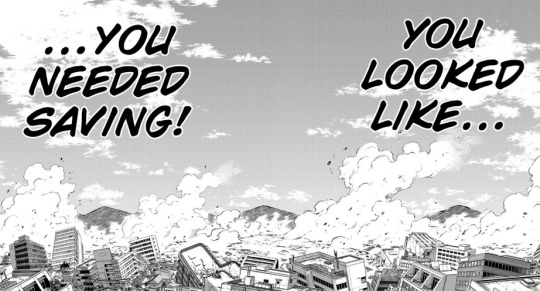
From this panel onward the central question Deku is forced to answer shifts from “Am I strong enough to defeat ShigarakI” to “Can I save Shigaraki?” However, much earlier than that All Might goes on to basically set up the win conditions of what makes the ultimate hero as someone who “Saves by winning, and wins by saving.”
All might: You can become the ultimate heroes. Ones who save by winning, and win by saving.
Therefore the story has set it’s criteria for what kind of hero Deku needs to become. If he wins without saving, then he’s failed to become what the series has set up as the Ultimate Hero.
Shigaraki and Yubel aren’t just narrative obstacles, or boss monsters to be killed like in a video game. They are narrative challenges, which means that the character can’t grow in any way if they don’t answer the challenge presented by the characters. They are villains who actively resist being saved, to provide a challenge for two heroes who define their heroism by saving others. The challenge they pose adds a third question to the story and the main characters.
"Can I save the villain?"
"Should I save the villain?"
"If I don't save the villain, then can I really call myself a hero?"
In other words the decision they make in saving, or not saving their final antagonist defines what kind of hero they are. In Deku’s case it’s even more critical he defines what hero he wants to be because the MHA is also a generational story, and several of the kids are asked to prove how exactly this generation of heroes is going to surpass the last one. The kids growing physically stronger than the last generation isn’t a satisfactory answer, Deku getting strong enough to punch Shigaraki hard is not a satisfactory answer, because we are reading a story and not watching a boxing match.
I’m going to focus on the last two questions though for a moment. Many people who argue against saving villains like Shigaraki argue he is a mass murderer and therefore isn’t worthy of salvation. However, the act of saving Shigaraki isn’t a reflection of Shigaraki himself, but rather the kind of hero Deku wants to be. It all boils down to Spiderman. In the opening issue of Spiderman, teenage Peter Parker is bitten by a radioactive spider and suddenly gains super strength, the ability to stick to walls along with other powers. However, being a teenager he uses these powers selfishly at first. He doesn’t feel the obligation to use his powers for other people, and therefore when he sees a robbery happening right in front of him he lets the robber go. However, because he lets the robber go, the robber then attempts to hijack a car and kills his Uncle Ben in the process. If Spiderman had stopped the robber then he might have prevented that from happening. He had the power to stop the robber, but he didn’t feel responsible or obligated to save other people. As a result Uncle Ben dies. It’s not enough to have power, ti’s how you use that power that reflects who you are, therefore: “with great power comes great responsibility.”
The choice to save Shigaraki actually has little to do with whether or not Shigaraki is redeemable, but rather how Deku chooses to use his power, and what he thinks he is responsible for reflects who Deku is as a person. Deku himself also clearly outlines how he wants to use his power, that One for All is a power for saving, and not killing.
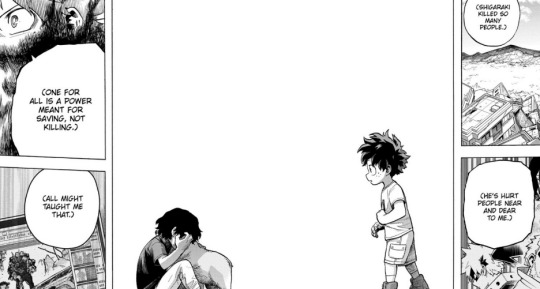
How he uses his power reflects Deku’s ideal in saving others, and therefore if he doesnt use his power to save, then he’s failed to live up to his ideals. It's not whether it's morally right to save a murderer like Shigaraki, but rather the way Deku wants to choose to use his power. It's about whether he feels the responsibility to save others.
Judai explores an incredibly similar arc to Deku. They are basically both asked what kind of responsibilities a hero is supposed to have, which is also a metaphor for growing up to handle the responsibilities of adulthood. As both characters start out with incredibly naive and childish ideas about what a hero is. Therefore realizing what a hero is responsible for is key to them growing as a character. However, Judai is different from Deku. In some ways he’s more like Bakugo. Judai is a prodigy who’s naturally good at dueling. He doesn’t duel to save others, but rather because duels are fun and he’s good at it. He’s very much like Bakugo, who admired All Might as a hero just as much as Deku did, but admired the fact that he was strong and always won rather than he saved others.
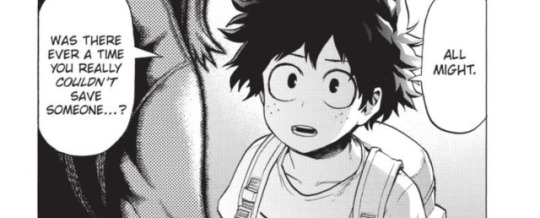
However, I would say both Deku and Judai are questioning what a hero is responsible for. They are both asking if they have the responsibility to use their power to save others. If they have to fight for other people, just because they have power. His first big challenge as a character comes from Edo Phoenix, who calls out Judai for not thinking through what it means to be a hero, and what responsibilities heroes carry. Judai duels because he thinks it’s fun. He will show up to duel to help his friends, but that’s because he’s the most powerful person in the group. Even then it’s because he finds fighting strong opponents to be enjoyable. Bakugo will beat up a villain, but for him it’s more about winning then if the action will save someone or not.
Judai is more often than not pushed into the role of being a hero, he doesn’t play the hero because he’s a particularly selfless person, and he’ll often avoid responsibility if not forced. He has power but no sense of responsibility and the narrative calls them out as a problem.
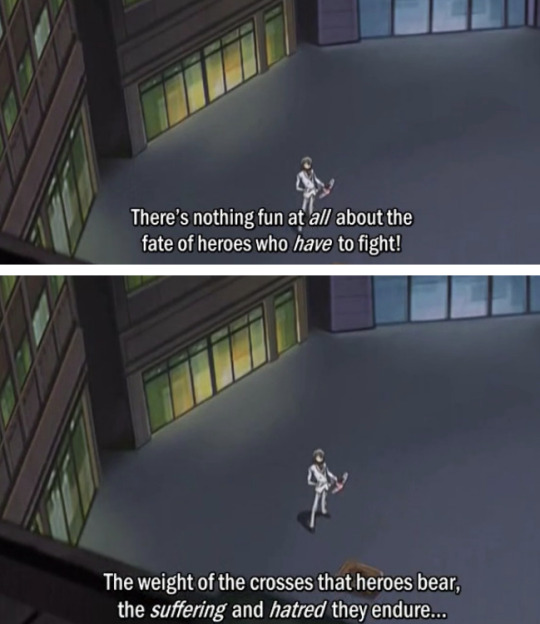
Edo: Can you even fathom that, Judai?
For Judai, he can’t understand the responsibility of being a hero. For Deku, he idealizes heroes so much he can’t understand that there are people out there the heroes have failed to save. These two callouts towards Deku and Judai are discussing similar because they’re both discussing where a hero’s responsibilities lie. Is a hero responsible for saving everyone? Is someone strong like Judai responsible for using their strength to help other people?
Judai’s arc continues into the third season where he’s not shown to just be naive but ignorant. He’s not just childish, he actively resists growing up because he doesn’t want to take on adult responsibilities.
THe same way that Deku just decides not to think about whether or not All Might failed to save people in the panels above. However, in Judai's case he's actively called out for his choice to remain ignorant.
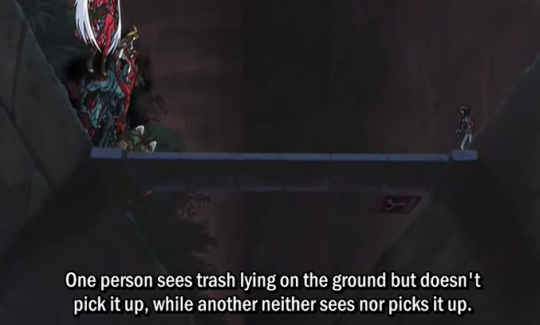
Satou: Now, which one is at fault? Judai: Isn’t it the guy who saw it, but didn’t pick it up. Satou: Not quite. If one is aware of the trash that fell, it may be picked up someday. But there is no possibility fo the unaware one ever picking it up. Judai-kun you are the foolish one unaware of the trash that has fallen. Judai: Are you calling me out for how I am? Satou: Your behavior towards me was atrocious. The worst was attending class only for credit, even if you were there you only slept. Judai: Yeah, I know. I was all bad, but it wasn’t that big a- Satou: It is important. You see, one by one, the students inspired by your attitude were losing their motivation. Now if you were a mediocre duelist, then this would not be an issue. Satou: However, you are the same hero who defeated the three mythic demons. Every single student in the academy admires you. You should have been a model for this academy. Judai: Me, a role model? Are you kidding? I just do whatever I feel like doing. Satou: Great power comes with great responsibility. Yet, as you remain unaware of that, you’ve spread your lethargy and self-indulgence.
seems like a minor issue, but look how Judai responds to the accusations. “I just do whatever I feel like doing.” Satou is arguing that Judai should pay attention to the influence he has on others because of his power, because how he chooses to use that power affects others. However, Judai chooses to actively not look at the consequences of his actions because he doesn’t want to take on that level of responsibility, and therefore he’s looking away from the trash.
While it seems like it doesn’t matter in Satou’s specific example, not thinking of the consequences, or how you use your power can have unexpected consequences. Spiderman doesn’t feel like it’s his responsibility to stop a bank robber, and that bank robber shoots his uncle. You could still argue it’s not Spiderman’s responsibility to stop every crime in the world, and I guess no one owes anyone anything from that point of view - but Spiderman failing to act responsibility had the consequence of directly hurting someone else.
Spiderman has to live with that consequence because it was his own Uncle that was hurt. This is where we really reach the duality of Judai.
In GX, Judai is, symbolically speaking, The Fool of the Tarot Deck, the Novice Alchemist — a person brimming with infinite potential, yet one who is also supremely ignorant, who walks forward with his eyes closed and often unknowingly causes harm in his great ignorance. In this, he is very much the embodiment of the faults we most commonly associate with teenagers — selfishness, recklessness, shallowness, a lack of dedication or empathy when it’s most needed. Like most people, he has good traits that work to balance out some of the above, but his narrative path through GX ends up being that of the flawed hero undone by his faults — and then that of the atoner, the repentant sinner. In his case, the mistakes of his teenage years are the catalyst for his growth from a boy into a man burdened with duty and purpose. Judai is someone with infinite potential, with great power, but also ignorant on how he should use that power, and that makes him an incredibly flawed hero who needs to learn how that power should be used.
Deku similarly exists in a society where heroes deliberately turn a blind eye to the suffering of a certain type of victim. Shigaraki’s speech heavily resmebles Satou’s speech about garbage on the side of the road.
Shigarali: "For generations you pretended not to see those you coudln't protect and swept their pain under the rug. It's tainted everything you've built."
Deku shares Judai’s ignorance, because he’s not only a part of a system that doesn’t even see trash on the side of the road, but he also worships heroes so much that he’s incapable of criticizing them. If Deku saw the flaws of heroes, but at first didn’t have the courage to speak out, but eventually gained the courage that would be one thing. However, if he doesn’t see the flaws of heroes, then the problem will never be fixed.
There are also consequences for both Judai and Deku failing to use their powers responsibly. These consequences take the form of the villains who came about because of all of society’s ignorance to the suffering of victims (Shigaraki) and because of the main character’s ignorance to their suffering (Yubel). Shigaraki and Yubel are also explicitly victims that the heroes failed to save, turned into villains who are active threats to the heroes.
Should I save the villain?
The answer is yes, because the decision to save is reflective of the kind of hero each character wants to be. Each story clearly sets up that Deku and Judai aren’t punisher style heroes who shoot their villains, they are being set up as heroes who save. Deku needs to “save by winning.” As for Judai, a big deal is made of Judai’s admiration for another character Johan who represents a more idealistic kind of hero. Johan unlike Judai is someone who duels with a purpose, something Judai outright says he admires because he’s empty in comparison.
Judai: Johan what have you been dueling for? See, it’s about fun for me… Well, for the surprise and happiness too. I guess I do do it for the fun. Sorry, I guess I put you on the spot by asking out of nowhere. Johan: What’s this about Judai? Judai: It’s nothing. Johan: I suppose there is one goal I have. Johan: Even if someone doesn’t have the power to see spirits, they can still form a bond with a spirit. That’s why I do it for people like him. [...] Johan: I'll fight for everyone who believes in me, and I'll do it with my Duel Monsters. Judai: I'm jealous you've got feelings like those in you.
Becoming a hero who uses their power to help others isn’t just a goal the story sets for Judai, it’s a goal that Judai sets for himself because of his admiration for Johan. Johan represents the idealistic hero Judai wants to be, but is also held back from because of his personality flaws. Johan represents the kind of heroic ideal that Deku is aspiring to be.
Johan’s ultimate goal isn’t punishing the wicked, but to use his power to save others.
Johan: Judai, it was my dream to save everyone through my dueling!
The story sets up the idea that it’s not enough for Judai to simply be strong, he’s also challenged to become a savior who uses his power to help others like Johan. Deku needs to “save by winning” and Judai needs to “Save everyone through his dueling.” However, Johan also adds another condition to what saving means. His idea of saving isn’t to defeat a villain, but rather his dream is to help connect spirits and humans together, even if there are humans who can’t see spirits. Johan doesn’t save people with the power of physical force, but rather the power of human connection.
Should I save the villain?
Here the answer is "Yes", because wants to become more like Johan someone who uses their power to help others not just for themselves. Then we reach the third question
If I don't save the villain, can I really call myself a hero?
It once again comes to power and responsibility. Heroes have great power, and they are responsible in how they use that power, if they use it irresponsibly then there are consequences. Shigaraki wants to destroy hero society, because the heroes irresponsibly use their power to turn a blind eye to everyone’s suffering.
People suffer when heroes fail to live up to their responsibilities. The entire conflict of season 3 is created by Judai failing to save Yubel. If Judai had helped Yubel when they most needed it, instead of abandoning them, then Yubel would never have been twisted by the light of destruction, would never have attempted to teleport the school to another dimension, would never have attacked all of JUdai’s friends.
These consequences matter. Deku can turn his eyes away from Shigaraki’s suffering, but let’s say a hero failed to stop a robbery, or rather he didn’t even try, and because of that his mom was shot and died in the street. Would Deku consider the man who failed to stop a bank robbery a hero? When Spiderman let a bank robber go instead of trying to stop him, was he being a hero in that moment? Both the stories and the characters themselves have defined heroes as people who use their powers to save others, therefore if Judai and Yubel fail to save their villains then they can’t be called heroes by the story’s own definition. Now let’s finally return to the question of "Can I save the villain?"
Was there ever someone you couldn’t save?
m going to start with Yu-Gi-Oh Gx as a positive example of how to save your villain. Gx works for two reasons. One, it’s established from the start that Yubel isn’t beyond salvation, and two, it makes it so Judai can’t win without saving Yubel. The conflict of the story does not end until Judai makes the decision to save Yubel. In some ways the writing is even stronger because Judai is directly responsible for the pain and suffering that Yubel went through that turned them into a villain in the first place. Yubel isn’t just a victim, they’re specifically Judai’s victim.
Yubel is a duel spirit who is also essentially Judai’s childhood friend. A duel spirit just like the kind that Johan wants to save. During their childhood Yubel got too overprotective of Judai, and started to curse his friends for making him cry or upsetting him in any way. Until everyone Judai’s age started avoiding him and Judai became all alone with only Yubel for company. Judai’s decision was to abandon Yubel at that time. He took the yubel card and shot them into space, hoping that being bathed in space rays will somehow “fix” what was wrong with them. I know that’s silly but just go with it. Judai abandoning Yubel had the unintended consequence of Yubel being subjected to the light of destruction, a corrupting light that subjected Yubel to years of pain. This pain literally takes the form of Yubel burning alive.
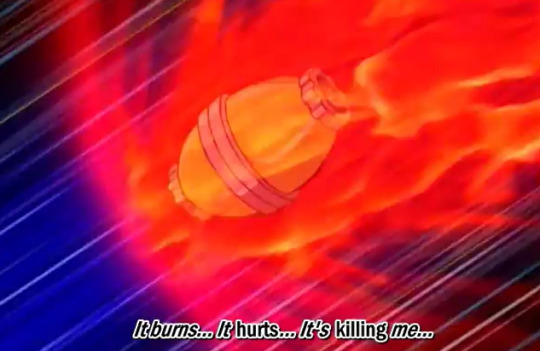
Yubel connected to his dreams called out for Judai every night, only for Judai’s parents to give him surgery that repressed his memories of Yubel causing him to forget them entirely. Yubel then spent the next ten years alone in space, continuously subjected to painful torture, with their cries for help being ignored.
"I was suffering even as you came to forget about me..."
Yubel is then met with the question of how can Judai treat them this way if they loved him so much? As from Yubel’s perspective, they’ve only ever tried to protect Judai, only for Judai to not only throw them away, but subject them to painful torture and ignore their cries for help. Judai effectively moves on with his life, goes to duel academy, makes friends while Yubel is left to suffer in silence all but forgotten. This is where Judai’s ignorance has serious plot consequences.
It’s not just the pain that Yubel endured that made them snap. It’s that their pain went ignored.
Yubel holds out the faint hope that Judai will answer their calls fro help until they finally burn up upon re-entry into earth’s orbit. At which point they’re left as nothing more than a single hand crawling on the ground. Yubel who cannot fathom why Judai would cause them so much pain, and then forget about them, convinces themselves that Judai must be causing them pain, BECAUSE he loves them.
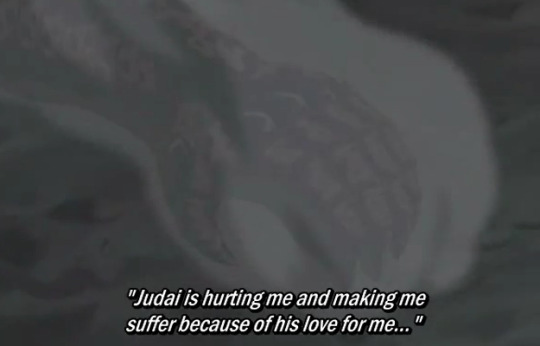
But you see, I couldn't possibly forget about you in the time that I've suffered...
Judai is allowed to move on with his life, to make friends, to spend the next ten years doing so while Yubel is subjected to ten years of agony. When they finally escape their painful torment, they see all the friends Judai has made while they’re left alone and forgotten. However, Yubel’s goal isn’t revenge. Rather, it’s to make Judai share and recognize their pain. WHich is why I said it’s not the fact that they were made to suffer, but their suffering is ignored. Yubel’s entire philosophy revolves around the idea that sharing pain is an expression of love, and that they and Judai share their love for each other by hurting each other.
"That's why I sought to fill all those linked to you, your world, with both sadness and anguish..."
For Yubel, making all of Judai’s friends suffer and Judai themselves suffer is a way of making them and Judai equals again. They want to show “their love” for Judai, but it’s more about forcing Judai to recognize the pain he’s caused them by forcing him through the same pain. Yubel’s philosophy of sharing pain is actually a twisted form of empathy.
They’re not entirely wrong either, that even people who love each other can cause each other pain, and that if one person is suffering alone in a relationship or the suffering is one-sided then there’s something wrong with that relationship.
Yubel: I get it now… You weren’t in love, with Echo. Yubel: No.. you may have loved her just enough to clear the conditions in palace for you to control Exodia, but the you didn’t truly love each other. Yubel: You were only unfairly hurting her, while you stayed unharmed. You wouldn’t suffer. You wouldn’t suffer. You wouldn’t be in pain. Amon: What are you getting at? Yubel: I’ve been hurt! I’ve suffered! I’ve been in pain. That’s why I’m making JUdai feel the same things I did!
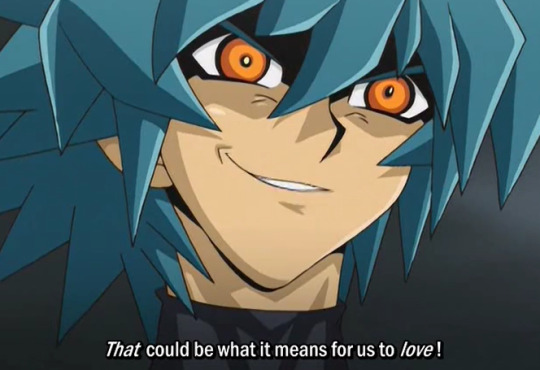
Yubel’s twisted theory of love, is a pretty thinly veiled cry for empathy.
They break out into tears when talking to Amon about the way they’ve hurt and suffered. They clearly state upfront that their goal is for Judai to recognize their love. One of the first things they say to Judai is a plea for Judai to remember them.
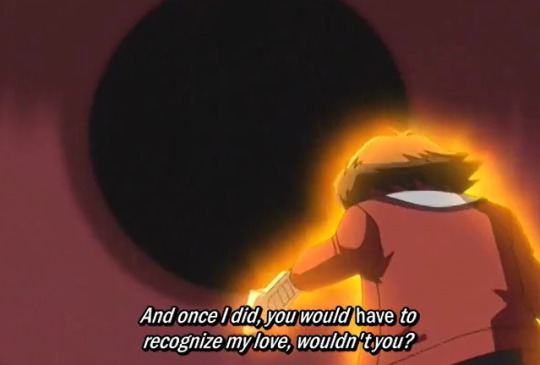
Yubel is presented as a very human character suffering through a lot of pain throughout their entire villai arc, they break down into tears multiple times, they cry out in agony, they're visibly suffering and you see their mental walls begin to break down when Judai denies them any empathy.
Yubel is actually incredibly clear and straightforward about their desire to be saved by Judai. However, Judai doesn’t lift a single finger to help Yubel the entire arc, even though they themselves admit they are directly responsible for Yubel’s suffering but they helped create who they are today.
Judai plunges into a different dimension and gives up everything to save someone, but it’s Johan, not Yubel they try to save. You have Johan, the perfect friend, and perfect victim that Judai gets obsessed over and will not stop at anything to save, and then you have Yubel, the imperfect victim that is actively harming Judai and all of his friends that Judai chooses to ignore. The whole season Judai only focuses on saving the perfect victim Johan, and this is clearly shown to be a flaw. Judai doesn’t just ignore Yubel to save Johan, he also ignores every single one of his friends.
Judai only caring about saving Johan, and deliberately ignoring and abandoning the friends who came with him to help, essentially abandoning them the way he did Yubel leads to another consequence. After he abandons them they get captured, rounded up, and actually die and become human sacrifices.
Losing his friends, causes Judai to snap. Judai becomes the supreme king and decides power is all that matters; he starts killing duel spirits en masse in order to forge the super polymerization card. Which means being left alone, suffering alone, being abandoned by everyone causes Judai to snap the exact same way that Yubel did.
In fact Judai is only saved from his darkest moment, because two of his friends sacrifice their lives, trying to get through to him and appeal to his humanity. At that point Judai’s friends could have just chosen to put him down like a mad dog, to punish him for the amount of people he’s killed, but instead they try to save him because of their friendship.
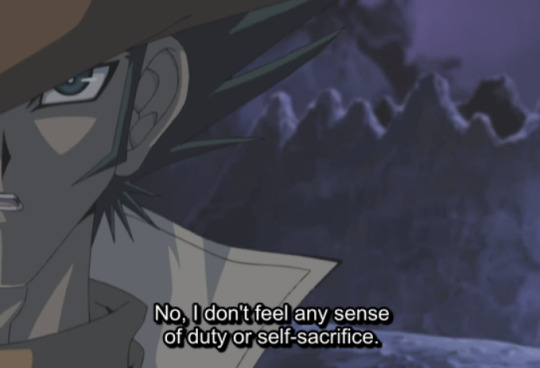
I just want to save my friend. That is all.
By the time Judai is facing Yubel in their final fight, Judai doesn’t have the moral highground against Yubel in any way whatsoever. They’ve both lashed out because of the pain they endured and killed countless people in the process of lashing out. The only real difference between them is that Judai is lucky. He had friends to support him at his lowest point, while Yubel didn’t. Does Judai learn from Jim’s example, and go out of their way to save Yubel the same way they were saved because Yubel is still a friend? Nope, Judai tries to kill Yubel at this point.
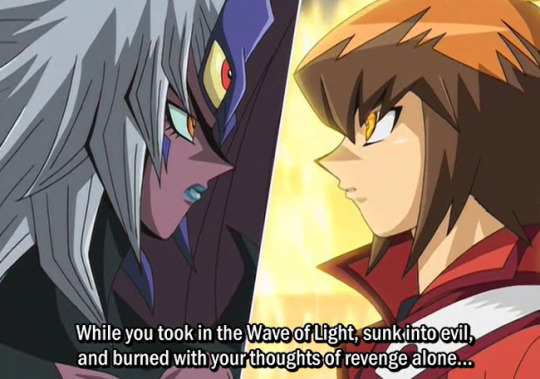
I made a lot of friends... And they all taught me something… real love is wide enough, large enough and deep enough to fill the universe. Your so-called love is only a conceited delusion.
Like, Judai, sweetie baby honey darling. How was Yubel supposed to make friends when they were floating in the empty void of space?
Judai hasn’t learned, they are still ignorant, and still turn a blind eye to Yubel’s suffering. After all if his love is wide enough, large enough,and deep enough to fill the universe then why don’t thy have any room in their heart whatsoever for empathizing with Yubel?
Judai making friends while Yubel was trapped in space doesn’t make Judai a better person than Yubel, it makes Judai lucky. Judai doesn’t even appreciate that luck, because he treats his friends like garbage. It’s not about whether Yubel is worthy of salvation, because Judai is a mass murderer and his friends still went to great lengths to save them anyway. It’s that Judai doesn’t want to empathize with Yubel, because they still want to remain ignorant and irresponsible. Judai wants to continue playing hero, with a very black and white definition of what a hero is. By this point Judai’s killed lots of people, but if he makes Yubel the villain in the situation, he can keep playing hero. He doesn’t have to look at himself and what he’s done, because blaming everything that happened on Yubel and then putting Yubel down like a mad dog allows Judai to absolve his own guilt. Judai practically ignores Yubel’s cries for help, even when Yubel spells it out for them.

I couldn't have lived with the heartache unless I felt that I was being loved...
At this point Yubel themselves acknowledges that their love was just a delusion. That it was a coping mechanism, because they couldn’t live with all the pain otherwise. WIthout it they would have just died, which makes Judai unmoved. The implication here is that Judai thinks yes, Yubel should have just died in that crater. It would have been easier for Yubel to die a perfect victim, then for Yubel to crawl out of that crater and go on to hurt other people. While that may be true the same can be said for Judai - it would have been better if Judai died rather than become the Supreme King. His friends could have put him down like a mad dog, you could have even called that justice - but they didn’t. Judai making no attempt to save Yubel isn’t because he thinks it’s morally wrong to save someone who’s killed as many people as Yubel has, or because he thinks he can’t forgive Yubel, it’s because Judai is taking the easy way out. Johan is a nice, easy victim to save, because he’s Judai’s perfect boyfriend, while Yubel is a complex victim that requires Judai to understand their suffering. Even the act of saving Johan isn’t about Johan himself, it’s about the fact that Judai feels guilt over Johan’s disappearance. What Judai wants isn’t really to save a friend, but to stop feeling guilty over that friend. Judai isn’t just disgusted by Yubel’s actions towards his friend, he also wants to avoid the guilt he feels over causing all of Yubel’s suffering, because it requires acknowledging the complex reality that he is both victim and perpretrator in this case, just as Yubel is both victim and perpetrator.
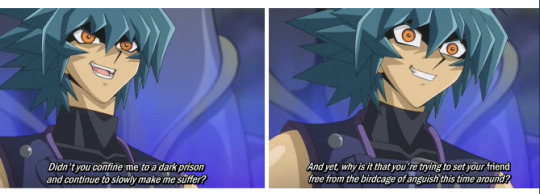
So how can an arc where Judai doesn’t try to save Yubel until the last possible minute, be better than an arc where Deku makes it his goal for the final act of the manga to save the crying boy in Shigaraki?
It’s because the story does not let Judai get away with his continual refusal to empathize with Yubel. Yubel’s entire character revolves around empathy, in the form of sharing pain. As a duel monster, Yubel���s effect is that they are a 0/0 attack monster who is immune to all damage, but when you attack them they deal all the damage back to you. Which means that Yubel will respond to all the pain they feel, by causing you just as much pain in return. Yubel is not a character who can be defeated in a fight, or a duel. In fact they’re the only Yu-Gi-Oh villain who never loses a duel once. The most Judai can do is duel them to a draw, and they draw three times. Yubel wins against everyone else who challenges them. In a way Yubel is like Shigaraki, the ultimate, unkillable enemy that can’t be done away with violence. Judai’s refusal to empathize with Yubel or attempt communication also makes them worse, every time Yubel is hurt they escalate. THe more Judai hurts them, the more they will hurt in return, it’s a cycle that will never be broken simply by killing Yubel, because Yubel is unkillable.
Not only that but the story has gone to great lengths to show that saving Yubel is the correct course of action. If Judai doesn’t save Yubel, he’s basically spitting on the selflessness Jim showed in saving him. In fact if he doesn’t save Yubel, Judai is contradicting his own words on what makes a good friend. Sho once asks Judai after witnessing his brother change, what he should do if a person you lov ehas changed into an entirely different person. What if they're a person you don't even recognize any more? A person you don’t even necessarily like anymore?
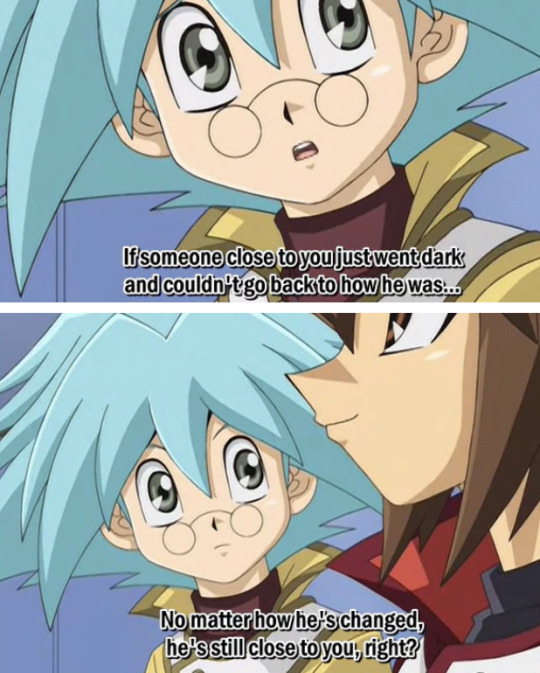
That's why if it were me. I'd probably just be looking after him until the very end, even if I didn't like him. I'd do it cause I think it'd prove that I care about him.
Judai doesn't even say that Sho is obligated to save his brother or morally redeem him, just that he has to keep looking at him instead of turning away or ignoring him.
Judai is being a bad friend, by his own definition. By choosing to deliberately look away from Yubel, Judai’s not living up to his advice for Sho for how you treat people you care about.
Which is why the resolution for Judai and Yubel’s arc is so important, because it’s done by Judai finally acknowledging Yubel’s pain, and promising to watch over them from now on, words that are followed by the action of physically fusing their souls together so they’ll never be alone again. Judai doesn’t just say pretty words about how they won’t ignore the crying child inside of Yubel, but instead he makes a sacrifice to save Yubel at risk to themselves to show their words are backed up by actions. Judai says Yubel will never be alone again, and then he commits.
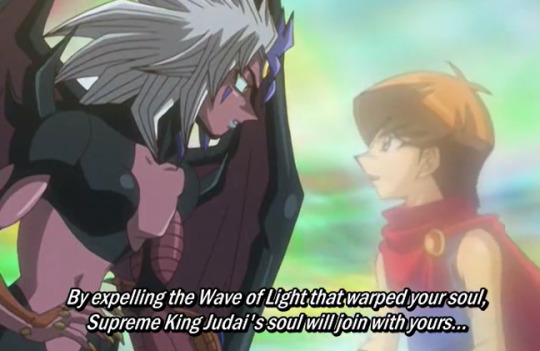
"And even if that means I won't exist anymore... I don't care."
Judai has resolved his character arc by this action, because Judai is finally taking on responsibility and that responsibility is watching over Yubel, so the two of them can atone together. Judai even says himself this isn’t an act of sacrifice on his part, but rather him finally accepting adult responsibilities.
Judai: I wouldn't sacrifice myself for you guys. I'm just going on a journey to grow from a kid into a man.
Judai needed to save Yubel to complete his character arc and grow as a person. If Judai hadn’t saved Yubel, he would have still remained an ignorant child. By learning not to turn a blind eye to Yubel’s pain, and also smacking sacrifices and physically doing something to atone for the way they ignored Yubel up until this point they’ve not only saved Yubel they’ve also done something to address their wrongs. This also continues into the fourth season where Judai’s personal growth results in him learning what kind of hero he wants to be as in Season 4 in order to atone for the spirits that Judai slaughtered, he decides to leave his friends behind and walk the earth with Yubel helping spirits and humans get along with each other. In fact Judai’s final speech as a character isn’t even about how strong he is as a hero, but how weak he is as a person.
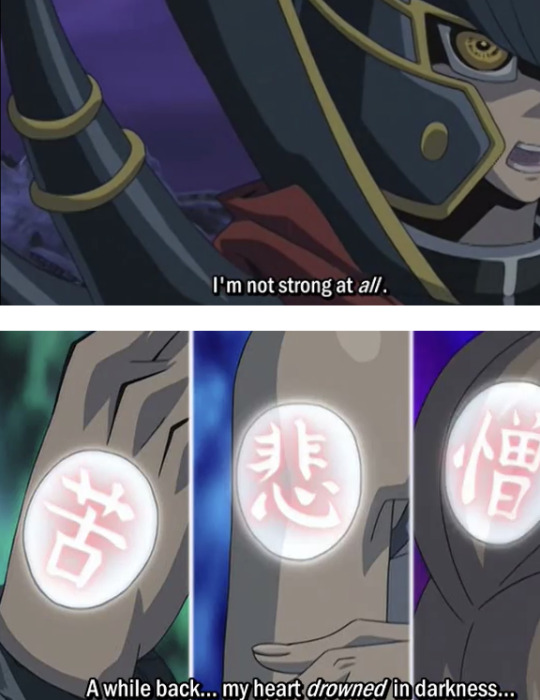
And I put my friends through some rough times. Form that, I figured a few things out... all I can do is believe in them.
The lesson Judai learned is because he’s weak, he needs to empathize and believe in other people the same way that his friends once believed in him when he was at his lowest point. Judai’s not the strongest hero, he’s the weakest one, but that gives him the ability to empathize with people who were lost just like he was, and guide them back from the darkness.
The story of how Deku became the worst hero.
I’m going to say this right now it might turn out next week that Shigaraki is just fine, and he’ll use the overhaul quirk to reconstruct his body. However, even if that happens Deku has completely failed at his goal of saving Shigaraki for the reasons I’ll illustrate below. In theory, Deku’s arc of saving Shigaraki, and therefore winning by saving should be much easier for the story to accomplish and also much less frustrating to watch. After all, Shigaraki has been around since the beginning of the manga, he’s literally the first villain that Deku faces. He’s also the first villain that Deku talks to, where he brings up the idea that there were some people All Might failed to save. There’s also many intentional parallels between the two characters, the entire manga is about their parallel journeys of becoming the next generation hero and the next generation villain. Shigaraki even directly quotes the line at one point that all he wanted was for someone in his house to tell him he could still be a hero, the same line Deku said in the first chapter was that he wanted his mom to tell him to be a hero instead of apoalogizing to him for being quirkless.
Not only is the setup for Shigaraki and Deku made obvious (Deku can redeem Shigaraki by telling him that he can still be a hero too), but Deku himself states out loud that he wants to save the crying child inside of Shigaraki.
Judai runs away from Yubel the whole time, whereas Deku is running towards Shigaraki and actively makes it his goal to understand Shigaraki and continue to see him as a human being rather than a villain. The story also makes it clear that saving Shigaraki is necessary to saving hero society as a whole. After all Yubel is just Judai’s victim. Whereas Shigaraki is the victim of all of society. He’s the crying child who was ignored. The cycle won’t be broken if heroes continue choosing to ignore people like Shigaraki, because more victims will grow up to replace him.
Shigaraki: Everything I've witnessed, this whole system you've built has always rejected me. Now I'm ready to reject it. That's why I destroy. That's why I took this power formyself? Simple enough, yeah? I don't care if you don't understand. That's what makes us heroes and villains.
Shigaraki rejects the world because the world continues to reject him. THe solution to this problem is not rejecting Shigaraki, because Shigaraki won’t go away, the system will just continue to reject people like Shigaraki. As long as heroes and villains don’t understand each other, they’ll keep being forced to fight and the conflict won’t end, because hero society is what engineers it’s own villains.
clear as day by the story itself. If the objective of saving Shigaraki is clear, then how exactly did the story fail in this objective? What went wrong? In this case it’s a failure of framing, and breaking the rules of “show don’t tell.” Stories are all about actions and consequences. When a character makes a certain action in a story, the way other characters around them, the world, and whatever consequences that action frames that action in a certain light. It provides context for how we are supposed to interpret that character in that moment.
For example, when a character does something wrong and another character directly confronts them over what they did wrong, that frames them as in the wrong. The story is criticizing the character for what they did wrong. Context is everything in a story. Stories are just ideas, so they require framing and context to communicate those ideas for the audience. Certain character attributes can be strengths or flaws depending on the context. My go to example is that if you put Othello in Hamlet, the conflict would be resolved in five seconds because Othello’s straightforward personality and determination would have him kill Hamlet’s uncle without questioning things. Whereas, Hamlet constantly questioning and second guessing himself would lead to the worst ending possible. However, if you put Hamlet in Othello, then Hamlet wouldn’t fall prey to Iago’s manipulations, because Othello doubts and questions everything so he wouldn’t believe Iago the way Othello did.
Hamlet’s contemplative and introverted nature can be a strength in one situation, and a flaw in another. Othello’s tendency to act without thinking things through can be a strength in one situation, and a flaw in another. Context matters, because context tells you how you’re supposed to interpret a certain characters actions, and therefore tells you more about that character. This is why people repeat “Show don’t tell” as the golden rule of storytelling, it’s one thing to say something about a character, it’s another to us the characters actions in the story itself to show them something about the character.
What’s even worse then breaking the rules of show don’t tell however, is telling the audience one thing, and then going onto show in the narrative something completely different. In that case the narrative becomes muddled and confusing to read. If I the narrator say “Hamlet is someone who overthinks everything” and then in the story Hamlet walks up to his uncle and kills him with no hesitation, then the narrator is straight up unreliable. It becomes impossible to tell as an author what message I’m trying to get across about these characters, because I’m telling you one thing and showing another.
This is why the writing fails in the second half of My Hero Academia because we are constantly told one thing, but then the story shows something entirely different and sometimes even contradictory to the thing we are being told.
Judai is a much worse hero than Deku, he always runs away from Yubel, and we’re never directly told that he’s supposed to save Yubel either. However, the narrative is incredibly consistent. Judai’s behavior of running away is consistent with his character. All the other character call Judai selfish for abandoning his friends (and they’re not even talking about Yubel). Judai is never painted in any positive light for his actions, therefore we as the audience understand Judai’s behavior is wrong and he needs to fix it. The narrative makes it clear that Judai needs to grow up, and Judai is never rewarded for his refusal to grow up, he’s ruthlessly chewed out, not by his enemies but also by his own friends. However, the narrative isn’t merciless on him either. Season 3 of GX is dark, but it’s not grimdark. Even when Judai loses his way, he’s still shown love and compassion by those same friends who go to great lengths for his sake. The narrative criticize Judai but it never insists that he’s beyond redemption and needs to be put down like a mad dog.
The message is very clear, that not only does Judai need to grow up, but he also deserves the chance to grow and change, which is why he should give Yubel a similar chance. In comparison the story sets out this clear narrative arc for Deku of understanding Shigaraki, but it never challenges him for failing to understand Shigaraki. If you listen to what the narrative says, how other characters describe Deku, and what Deku himself says and only read it on a surface level then yes, Deku’s goal is to save Shigaraki. If you analyze actions however, he is in effect just like Judai he never takes any meaningful action or steps towards Shigaraki, nor does he think of what saving Shigaraki might look like or entail.
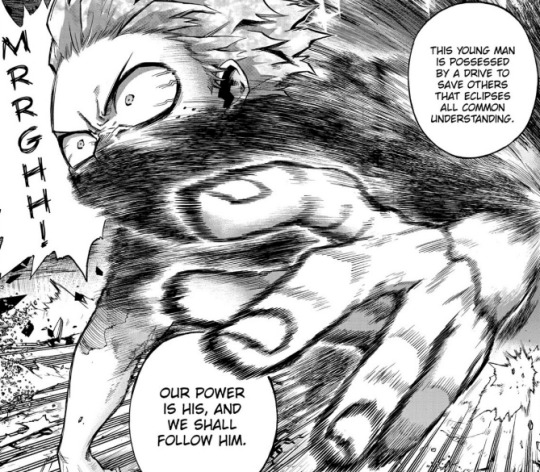
The story describes Deku as someone who is possessed by a drive to save others that eclipses all common understanding, but does the story give us any examples of that behavior?
Judai is characterized as a selfish, irresponsible child, and the story gives us countless examples of his immaturity and how it hurts others. Does the story of MHA do the same for Deku's purported virtues? Let’s run through Deku’s actions, step by step, the actions themselves and how they are framed in order to find any evidence that Deku possesses this drive to save others. Does Deku reflect at all on the question of:
Can Shigaraki be Saved?
Deku leaves on a journey to try to understand villains. When he makes a perfunctory attempt to understand and empathize with Muscle, and Muscle replies that some people are just evil does Deku keep trying to reach his heart? Nope, he just punches him.
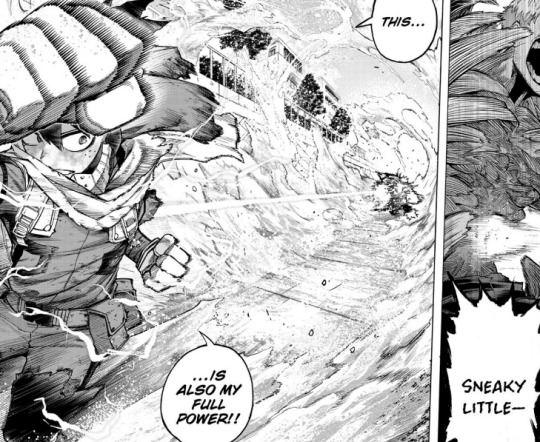
Well, if he’s failed in his goal of understanding a villain then does the story call him out on his failure? Does Deku face any sort of narrative consequence for that failure? Is he framed negatively for failing to understand Muscle, the same way that Judai is framed for abandoning Yubel? Nope. Deku doesn’t express any frustration at all over is inability to reason with Muscle. There’s also no negative consequence for Deku just choosing to punch muscle, it turns out that there was no reasoning with Muscle and some people are just bad eggs so Deku was right. It’s okay for characters to fail, but if a character fails and it’s not framed by the story as a failure then the writing itself as failed. Why even bother to include this scene in the first place if it doesn’t advance Deku’s character in any way? This scene in spite of showing Deku failing to understand someone actively paints Deku in a positive light, because of how much stronger he is ow that he can OHKO a guy that gave him trouble all the way back in the camp arc.
This scene doesn’t tell anything about Deku as a character, it just makes him look cool. In fact that’s precisely the problem, Deku isn’t adequately challenged as a character, because he’s never allowed to fail. Even when he does obviously fail at the things the narrative set out for him to do, he’s never challenged on those failures, because the priority isn’t to make Deku grow, it’s to make Deku look good. As I said before, Judai is the hero because he’s the weakest. Deku is the hero because he’s the strongest. Well, next a big flaw on Deku’s part is that he worshippd the same heroes that were making the world corrupt. Heroes like Endeavor who created people like Dabi. So, does Deku take action to either criticize the older generation of heroes, or separate himself from them in order to try to be better than them? Nope, he teams up with them. Not only that, Deku can’t do something as simple as tell Gran Torino out loud about his plans to save Shigaraki. If Deku feels that Shigaraki is worthy of salvation then he should at least try to make an argument here about his ideal of saving others.
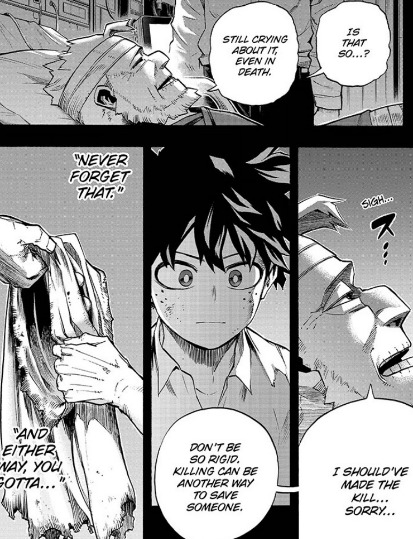
Now here’s the thing, if Deku hadn’t directly looked at the camera and told us he wanted to save Shgiaraki, would we be able to deduce his intentions from his actions? If you took away all of Deku’s internal monologue, and just showed him punching Muscular and saying nothing when Gran Torino says he may have no choice but to kill Shigaraki would anything about Deku’s actions indicate that he wants to save Shigaraki? Let me use avatar the last airbender as a positive example for a moment. People say that Aang’s desire to spare Ozai’s life comes out of left field, but like if you analyze Aang as a character down to their bending, and the way they react in situations they always prefer de-escalation, or taking a third option as opposed to confronting things head on. It’s literally why Toph says Aang has trouble learning earth bending, because as an airbender, he always tries to look for some other way to solve the problem, instead of a direct confrontation with force. As early as season one, Aang tells Zuko someone who has tried to kill him several times that he was friends with someone from the fire nation one hundred years ago and in a different situation they could be friends. Aang’s desire to save the Firelord may not have been told to us until the last possible minute, but Aang’s aversion to violence has always been a part of his character from the beginning. However, Deku never shows any similar aversion to violence. There’s basically no example where he ever tries to de-escalate a situation, or he avoids a conflict by seeking a third option.
Anyway, let’s move onto the next example. In the confrontation where Lady Nagant fights Deku, when Deku learns the fact that the heroes were employing government hitmen to attack people for uhh… exercising free speech does Deku give any reaction to this information? When Lady Nagant says that Deku is only going to bring back the status quo, does he show her any meaningful evidence that he won’t do that.
Deku’s response is because the world is so grey, he needs to extend a helping hand to others. Which you know what thay could be a response. Deku saying that his response to the corruption of the hero world is that he now understands that society led some people down the wrong path, so his way of addressing the wrongs of that society is lending a helping hand to as many people as possible even people he used to think was irredeemable.
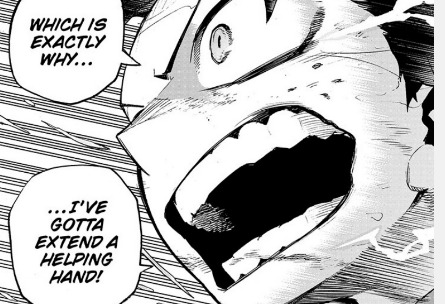
I will give Deku the benefit of the doubt, I think this is an acceptable answer. I can’t save everyone, but that’s not going to stop me from trying to save as many people as possible and maybe I can save people who were this society’s victims on the way too. However, does Deku demonstrate his resolve to extend a helping hand in any meaningful way.
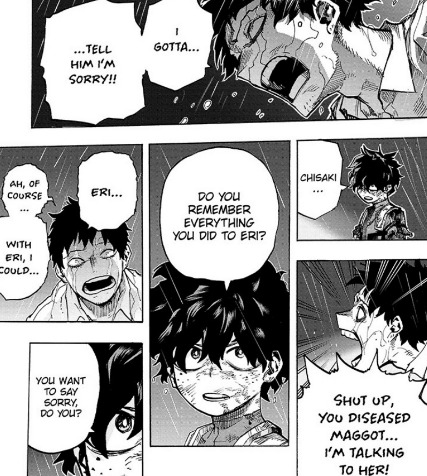
Deku is met with an armless, insane Overhaul who’s begging for someone to help heal his father figure in the Yakuza from his coma. This isn’t like Muscular who insists that there’s no helping him, Deku is met face by face with someone asking him for help. Deku’s gotta extend a helping arm whenever he can, because he knows some people were abandoned and led astray by this society… Unless that person is someone he doesn’t like personally. At which point he only helps them on a conditional basis. We are told Deku will save anyone and everyone, but Deku is met face to face with an armless man who is begging for help and Deku’s does nothing to help him. Deku’s not criticized for refusing to help overhaul either, it’s never brought up again. When Deku begins to experience a mental breakdown because of all the people he’s trying to help in the Dark Deku arc, we are told this is the result of Deku trying to save everyone, but we do not see Deku attempting to save a single villain after Muscular and Nagant.
He exhausts himself beating up villains that AFO sends after him, and only helping innocent civilians. Which would be fine if this arc were about how Deku is running away from his real responsibilities the same way that Judai was running, but that’s not what we’re being told. We are told that this is all part of an arc of Deku learning to understand villains and be a hero.
Deku is asked “Can you save Shigaraki?” by the story, but Deku never at any point has to deliberate on that question. Judai doesn’t deliberate on that question either, but him choosing not to think about things and stay ignorant is the point.
It’s actually fine to make Deku stagnate as a character. It’s fine to have him take the easy way out by just punching villains and giving up on them after one conversation. It’s fine for him to be empathetic to other people’s suffering, or even self-righteous. It’s fine for him to be ignorant.
He could be all of those things if it was a part of a narrative teaching him to unlearn his behavior. In fact the narrative might have been better if Deku started out by saying he didn’t want to save Shigaraki, that there was no choice but to kill him, because then at least his actions would be consistent with his words. Then his lack of empathy and his tendency to resort to violently beating up villains instead of avoiding violence would be character flaws he could work on. Deku however, is presented to us as this empathic hero who is always willing to give others a second chance though he never actually sticks his neck out in order to do so. Continuing on with our slow crawl through MHA, one of Deku’s friends is revealed as the traitor. Deku has a heartwarming scene fo saying that Aoyama can still be a hero, but look at his actions. He lets the adults in the room physically tie Aoyama in a straightjacket and imprison him, for the crime of… doing bad things while he was in a hostage situation. Apparently, if a bank teller helps the bank robber by giving them money when the robber has a gun to his head, the swat team should just snipe the bank teller. Not only does he not defend Aoyama against the adults, or stand up for him, or tell the adults they’re wrong to treat Aoyama a clear cut victim who had a gun to his head and was bing held hostage like he’s a villain - he also lets the adults use Aoyama an innocent victim as bait in order to lure out AFO. Deku tells Aoyama he can still be a hero, but he doesn’t defend Aoyama as a victim of being taken hostage, nor does he stop the adults from further taking advantage of him and throwing him right into danger. Some people are just led the wrong way that’s why they need to be extended a helping hand, but fuck Aoyama I guess. He needs to earn the right to be sympathized with by physically putting his life in danger.
Deku can’t even go out of his way to save a friend who he’s known for the better part of a year, when that friend is a complex victim forced to do bad things.
Then Deku and Uraraka have a conversation where they both, kind of ruminate on the idea that maybe the villains are human beings who are worthy of sympathy.
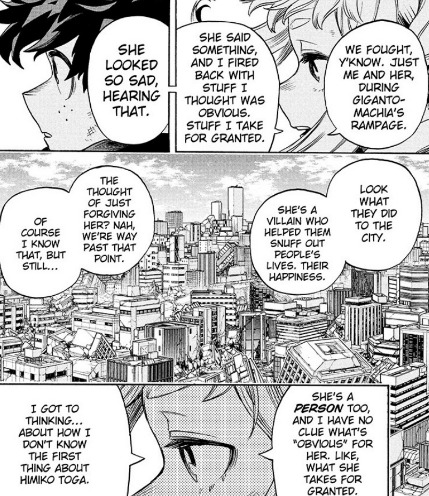
In fact Uraraka is actively trying to dehumanize Toga by looking at the destroyed city, so she won't have to think of Togaas a person.
The language here is also a major fault of this arc. It focuses far too hard on “forgiveness” over and over again. As I said before, saving Shigaraki isn’t about Shigaraki at all, it’s about Deku, and how he wants to use his power as a hero. Deku has even stated himself that he doesn’t believe that OFA is a power that should be used for killing people. So why does whether Toga or Shigaraki are forgivable or not even matter? It’s the same with Deku refusing Overhaul any sympathy. If he’s so morally opposed to abusers, then why does he work with Endeavor and defend him at every visible opportunity, even in front of his victims? Whether or not Deku can forgive Shigaraki doesn’t matter, because Deku is not the moral arbitrator or right and wrong. In fact Deku doesn’t even have any morals, so how is this a moral debate? Is there any point where Deku gives a clear definition of what he thinks right and wrong is? Does he quot Immanuel Kant to the audience?
Batman doesn’t kill people, not because he thinks that every last person on earth can be saved, but because Bruce Wayne an incredibly rich white man thinks that maybe he shouldn’t have the authority to decide who lives and who dies. When Bruce doesn’t kill the joker, it doesn’t mean he thinks the Jokers actions are forgivable, it’s because Bruce thinks it’s not his place to determine whether someone has the right to live.
The whole conflict that MHA presents us is that heroes pick and choose who to save, and only save the ones they deem as innocent. So, how does Deku saying repeatedly they can’t forgive Shigaraki contribute to that theme in any way? In fact by focusing on forgiveness, rather than whether or not he personally has the right to pick and choose who lives and who dies Deku is ignoring the elephant in the room. The question isn’t about whether Shigaraki’s redeemable or if his deeds should ever be forgiven. The question is whether Deku has the right to decide who gets saved and who doesn’t.
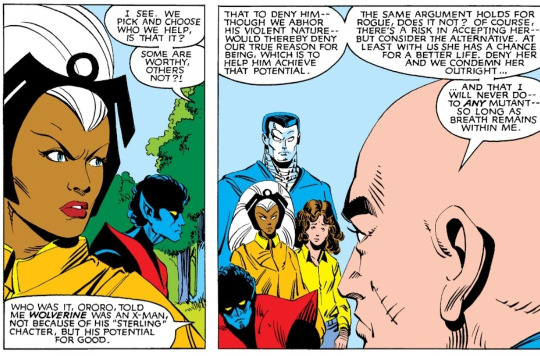
We are told that Deku as a character is someone who wants to save everyone no matter what, so Deku shouldn’t be focusing on whether or not Shigaraki is worthy of forgiveness, he should be making an idealistic argument like Xavier does in this panel. Why doesn’t Deku talk out loud with Uraraka on how he believes his power is for saving others, and not killing? If he’s meant to represent some idealistic hero, then why doesn’t he even talk about his ideals? Why don’t I as the reader know what those ideals are?
I think Xavier’s ideals of forcing the X-men to provide a good example to the mutant community, in order to try to earn the respect of other human beings is wrong, but at least he has ideals. He tries to inspire the other people around him to live up to those ideals. The story can criticize him for his ideals and point out how they’re wrong, while it can also uplift parts of his idelogy like where he believes there are no evil mutants. Deku has a chance to do the same to Uraraka, to tell her clearly, “I don’t think we as heroes have the right to pick and choose who we help…?” but he waffles. Not only does he waffle, but this moment is meant to be read as an indication that both Deku and Uraraka are sympathetic individuals who want to save their villains. They are supposed to look good and idealistic here and they don’t. For Deku it just seems like a repeat of his behavior with Overhaul. The only villains that are worthy of sympathy, are the ones that he personally decides are forgivable.
The story isn’t about whether or not it’s moral to save someone who’s killed as many as Shigaraki has. The story never seriously discusses any sort of complex morality or moral philosophy. Once again to bring up avatar, yes you can argue Aang sparing the life of a war crimminal is bad, but Aang mentions on multiple occasions that he wants to retain the cultural values of the airbending people. Aang has a morality, a consistent morality, it might not be a morality you personally agree with but at least he has one. Deku hates abusers, unless he’s next to Endeavor then he thinks abusers should be given the chance to atone. Deku doesn’t believe that One for All is a power for killing, but he never stands up to any of the adults who are blatantly trying to kill Shigaraki, he doesn’t even express out loud to Uraraka that he doesn’t think heroes have the right to decide who lives and who dies. In fact he’s given the perfect opportunity to, when Hawks kills a villain and it’s broadcast live on the news in font of everyone, but Deku never has anything to say about that. The reason Deku and Uraraka both put such an emphasis on “forgiving” their villains has nothing to do with the story itself. It’s because the author Horikoshi, is afraid that some people will misinterpret his story as saying that he actually thinks that saving a villain like Shigaraki means that he condones mass murder, so he has to have the characters talk about not forgiving Shigaraki.
Judai doesn’t have any consistent morals either, but once again that’s the point and something the story relentlessly calls him out on.
Cobra: Fortune would never smile on a fool like you who fights while prattling on about enjoying duels. Cobra: You are certainly a talented duelist. But you have one fatal flaw. Judai: A fatal flaw? Cobra: Yes, your duels are superficial. Someone who fights with nothing on his shoulders, cannot recover once he loses his enjoyment. What a duelist carries on his shoulders will become the power that supports him when he's up against the wall! Cobra: But you have nothing like that! Those who go through life without anything like that cannot possibly seize victory. Cobra: But I know that nothing I say will resonate with you... because you have nothing to lose but the match. Judai: I... Cobra: Afraid aren't you? Right now, you have nothing to support you.
Judai’s regularly called out for his superficiality. Judai is only a hero because he’s strong and wins fight, he doesn’t feel any responsibility towards other people, and in fact he loathes having to feel responsible for others. Judai isn’t just naive, he deliberately chooses to remain ignorant. Since he’s ignorant of his own faults, he makes awful decisions when it comes time for him to lead, and his friends die because of choices he made. We are told that Deku doesn’t want to remain ignorant, that he wants to understand villains, but Deku’s actual actions are him continuing to ignore society’s ills and the suffering of victims. In fact if you take away Deku’s internal monologue and the narration, Deku’s actions almost exactly mirror Judai’s.
Deku is just as superficial as Judai, and he also doesn't want to spend any time thinking about what kind of hero he wants to be, but the narrative never punishes him for it.
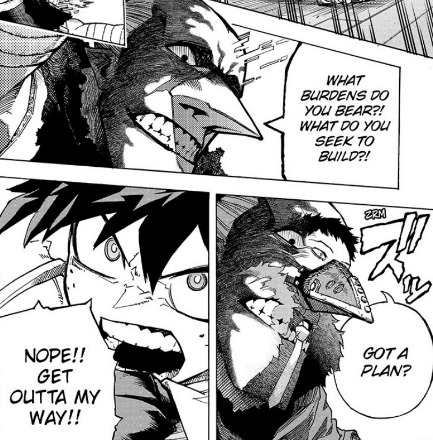
Judai is asked what burdens he has to bear and he has to meaningfull answer that question, Deku is allowed to get away with not having to think about anything. Deku remains superficial. Both Judai and Deku spend the entire arc running away from their villain rather than confronting them in any meaningful way. They both never express out loud any sympathy for their villain, or try to empathize. THey both never step down from the role of hero, and only confront their villain as a hero, because they don’t want to think about themselves as complicit or in the wrong. Shigaraki and Deku’s final confrontation mirrors Judai and Yubel’s but without the same clear framing. THe entire time Yubel is trying to get Judai to empathize with them, and Judai only responds with physical violence, because they don’t want to stop being the hero and because they can’t see Yubel as anything other than the villain. As soon as Deku arrives on the battlefield (by the way everyone else and their mom pointed this out, but Deku who doesn’t think OFA is a power for killing, is completely okay with a plan called the “Sky coffin plan” where every other hero was clearly trying to murder Shigaraki).
When Deku arrives he asks if Shigaraki is still in there, but he doesn’t do anything to try to reach Shigaraki, he jumps right to punching him. In fact he never tries anything besides punching him as hard as possible. How is punching Shigaraki with the force of a thousand suns saving him exactly? How is that different from how he tried to defeat Shigaraki the last war arc, before he saw the image of the crying child that made him want to try a different approach in saving Shigaraki? In Judai’s final fight with Yubel, it’s made explicitly clear that Judai is not trying to save Yubel, and that’s a fault on his part. In fact Judai gives the traditional “I have friends, and you don’t” speech to Yubel but it’s a subversion of how that speech is usually used. Usually that speech is used to show that the protagonist won because of they valued friendship,while the villain treated their friends poorly and only cared about power. However, it’s ironic in this case because Judai got all of his friends killed. Judai treats his friends like garbage. This speech isn’t used to show that Judai is winning because he values his friends more than Yubel does, it shows that Judai is a hypocrite, playing the hero in this situation where they are just as bad as Yubel. Judai’s not morally superior, he’s just lucky that he has good friends. Friends that were willing to save him. The only connection Yubel has to anyone else, Yubel’s only friend is Judai and Judai is a shit friend.
In fact, Mirio tries to give a version of the “You don’t have any friends” speech to Shigarkai, only for Shigaraki to get mad and tell Mirio that he does have friends and people he wants to protect.
This fact is also something that is blatantly ignored by Deku, even though Mirio tells him about it… even though we are told that Deku is trying his best to see the humanity in Shigaraki.
Judai blatantly admits they’re trying to kill Yubel. Which makes them a worse person, but a better character than Deku, because their actions are clearly framed by the narrative and consistent.
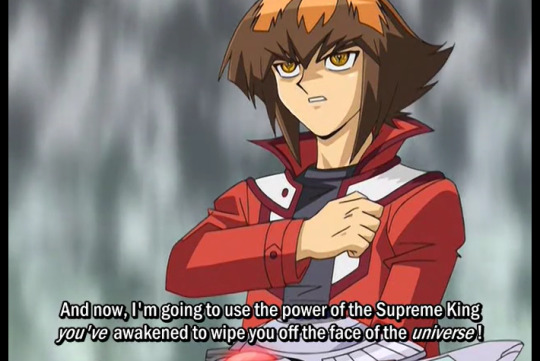
On the other hand we are told that Deku doesn’t want to kill Shigaraki, and yet everything Deku does makes it look like he’s just trying to kill Shigaraki and put him out of its misery. If we didn’t have Deku stating out loud that he wants to save Shigaraki and wants to see him as a human, there’d be nothing in his actions to indicate that he’s trying to avoid killing Shigaraki. Deku says he can’t pretend he didn’t see Shigaraki crying, but like, does he ever hesitate to punch Shigaraki, does he ever think that causing Shigaraki more harm is wrong when he’s already suffered so much? Deku says that Shigaraki is a person but does he treat him like a person? Does he try to talk to him like a person? To use avatar again, Aang does talk to Zuko pretty early on. Deku doesn’t even give the classic “We could have been friends under different circumstances” speech. When Shigaraki resists Deku’s attempts to see him as a person or emapthize with him, Deku’s response is to just resort to punching harder.
Which is in effect the same thing Judai does to Yubel, just kill them as a villain so they don’t hurt anybody else, but framed in an entirely different light. Judai is shown to be ruthless, and cold in his attempt to only settle the conflict with Yubel by violently putting them down. On the other hand we’re being told that Deku is compassionate and empathic while he punches Shigaraki with the force of a thousand suns.
There’s another eerie similarity between both of these final confrontations. At the climax of the confrontation, both Judai and Deku have a psychic vision where they see events from Yubel and Shigaraki’s childhood. This vision is supposed to help both characters understand the good in the villain they’re facing.
Let’s see the contents of this vision and how the visions change each character. Judai is shown a vision of his past life where Yubel sacrifices their entire body, and even their humanity to go through painful surgery to turn into an ugly dragon, all for the sake of protecting Judai in a previous life.
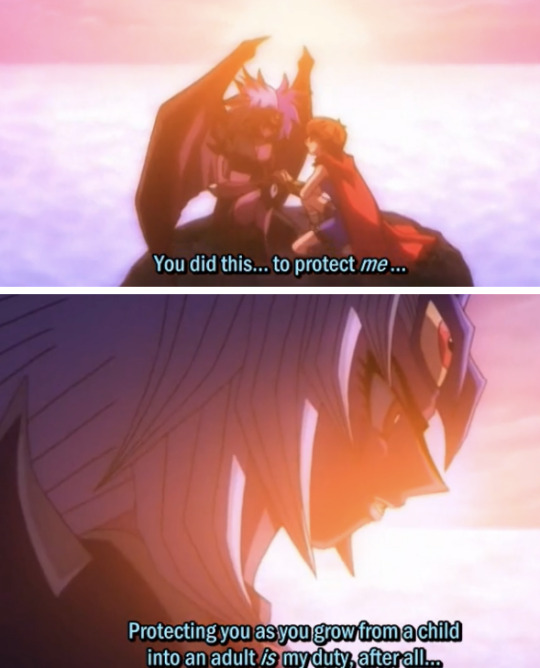
Judai is then forced to witness the good side of Yubel they’ve been ignoring all along to paint them as a villain. Yubel is simultaneously extremely selfish and willing to hurt people Judai cares about, but they’re also extremely selfless and will do anything to protect Judai and have made great sacrifices in the past for Judai’s sake. Deku gives lip service to not ignoring the humanity in Shigaraki, but Judai is literally forced to acknowledge the humanity in Yubel. Not only that, but Judai changes his behavior immediately after learning this new information. After seing the sacrifice that Yubel made for him in the past, Judai responds with a sacrifice of his own. A sacrifice that perfectly mirrors the sacrifice that Yubel once made for him. Yubel gave up their humanity for Judai, so Judai fuses his spirit to Yubel’s, becoming a human / spirit hybrid so Yubel no longer has to be alone.
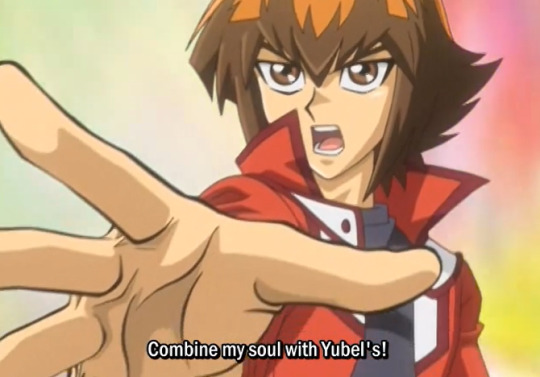
Judai also doesn’t just fuse their soul with Yubel’s in order to stop Yubel from destroying everything, it’s because both of them at this point need to atone together, and Judai is fulfilling his responsibility of watching over his friend until the end to prove that you care about them - as he said to Sho. Judai’s also fulfilling Johan’s dream of helping repair the bonds between spirits and humans, by reconciling with Yubel and repairing their bond. It’s also Judai atoning for his previous behavior of abandoning Yubel, by choosing to stay alongside them as they both atone together. Deku does sacrifice OFA during the fight against Shigaraki, but their sacrifice isn’t to help Shigaraki, but rather doing psychic damage to Shigaraki by using OFA is the only way to defeat them. He transfers OFA in order to break Shigaraki’s brain so he’ll stop reissting and Deku can beat him down. Judai fuses their soul together with Yubel out of empathy and a responsibility they feel to help their friend fater abandoning them, Deku transfers One for All to Shigaraki in order to hurt him and make him easier to punch. It's funny that Deku doesn't travel to Shigaraki's mind to learn more about him, but instead with the specific intent of harming him.
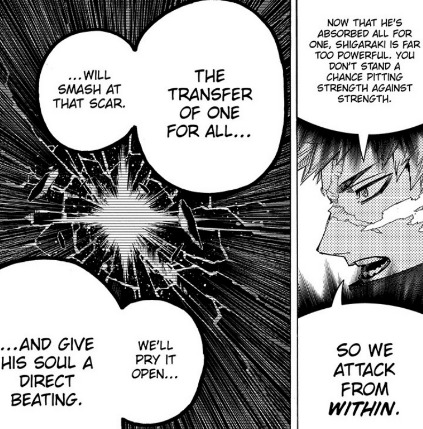
Once he's inside Shigaraki's mind, he doesn't take time to reflect on how Shigaraki used to stand up for bullied kids, or how he wants to be a hero to villains because no one else will stick up for the outcasts in society. No, he only care about Shigaraki when he takes the form of a child crying for help.
In the aftermath of the psychic vision Deku’s behavior doesn’t change towards Shigaraki in any way either. You could say he sacrificed his own arms in order to try to comfort Shigaraki within the depths of his own mind - but that’s not a real sacrifice either because his arms immediately come back. When Judai learns about the sacrifice that Yubel made in a previous life towards him, he stops seeing Yubel as an enemy and finds a way to resolve things peacefully between them. When Deku lanterns that Shigaraki’s a victim of All for One, and that his entire life was a lie, when he sees Shigaraki’s suffering first hand does his beavior twoards Shigaraki change in any way?
When he sees Afo has taken over Shigaraki’s body again, does he try to shout for Shigaraki, to tell Shigaraki to fight from the inside, to reassure Shigaraki that he’s still in there that there’s still good in him? Nope. He just punches Shigaraki some more.
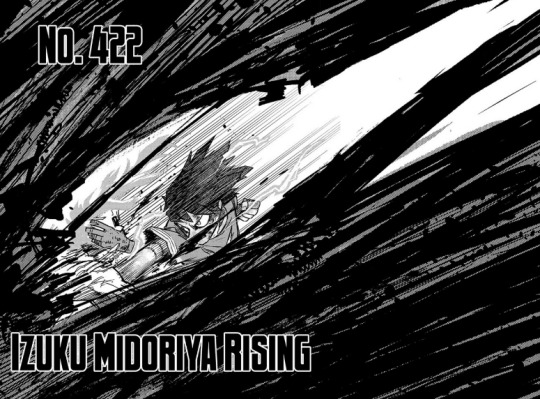
What Deku needed to tell Shigaraki is so obviously set up by the narrative too. Shigaraki wanted just one person in that house to tell him he could be a hero. Deku wanted his mother to tell him he could be a hero if he was quirkless. Deku sees that Shigaraki started out as a boy who wanted to be a hero, and who was manipulated into being a villain but does he try to appeal to the boy inside of Shigaraki by telling him he can still be a hero? Does he now see the good in Shigaraki? Nope, he just tries to kill him by punching him really hard.
I purposefully chose the images for the banner of this post, because it shows how differently MHA and GX treated its villains in the end. Yubel is embraced by Judai in the end, Shigaraki evaporates into dust.
"Judai, now that our souls have become one we will never be separated again. I have now been filled with your love and power. Let us fight together, against the wave of light leading this universe to destruction!"
Shigaraki could so easily have been given the love and empathy that Yubel was shown, but instead their life ends with no show of empathy from Deku, and with them dying believing that their long life of tragedy meant nothing in the end. Shigaraki realizes he's a crying kid, but he's never comforted.
Shigaraki: I only stole my body back from Master, and I didn't destroy anything. "In the end, I was just as you said... A crying kid, huh?"
Yubel is embraced and comforted, Shigaraki disintegrates into nothing.
One of these stories is apparently an optimistic story about heroes saving people, but it ends with the lifelong victim being killed in the most nihilistic manner possible, never receiving comfort, and never achieving anything with his long life.
The other story is a silly anime about card games, shows that when people are alone and suffering they can lash out and do terrible things. That all people are weak especially when they're alone, but the solution isn't to abandon them, or condemn them for their faults, but to believe in them and help uplift them the same way that Judai decides to uplift Yubel so they can atone together.
Which is why Deku gets an F in being a hero. Go directly to summer school. Do not pass Go. Do not collect $100.
#mha meta#ygo meta#mha 423#bnha 423#mha 423 spoilers#bnha 423 spoilers#izuku midoriya#deku#shigaraki tomura#tenko shimura#judai yuki#yubel#soulshipping#yu gi oh gx#yu gi oh
750 notes
·
View notes
Text
Nothing Like A Sharp Dressed Man (Nam-gyu X F!Reader ONESHOT)


warning: smut | not proofread | lowercase intended | roommates to lovers(?) | light choking | degradation | oral (m! receiving) | PiV (wrap your willy if your gonna get silly) | nam-gyu’s a bit of a dick (shocker i know) this is my interpretation of the character, please be respectful even if my opinion on the character differs from your own
character: nam-gyu (player 124)
A/N: saw a drawing someone made of nam-gyu in his work attire pre the squid games and my mind got straight to work. i know this is not requested but i need to indulge in some OG works from time to time. enjoy!! (THE SMUT PART IS A BIT SHORT I FEEL, I APOLOGIZE)
MDNI! 18+ content beneath the cut, reader’s discretion is advised

your experience with roommates was interesting, to say the very least. it truly was luck of the draw when it came to the array of characters you’ve shared a space with— but hey, anything to stay afloat and pay rent, especially in this economy.
when you first met your latest roommate, nam-gyu, you were certain the two of you would not get along. he was smarmy, standoffish, and just plain rude. not to mention he was a complete hypocrite; whenever you had a friend over at any point of the day, you would get texts from him telling you to keep it down (or rather “shut the fuck up”, if you were going to quote him directly) due to him having to work later that night. but whenever he had friends over at ungodly hours of the night, making all sorts of noise and blaring music, you weren’t allowed to comment on it. he wouldn’t fight you on it, but you may as well not say anything because it truly is in one ear and out the other with nam-gyu.
you two never agreed on anything. you were almost always at each others throats, it even got to a point where you would go out of your way to spite one another— for example, one of you might use the last of something without replacing it, or say if you wanted to watch TV in the living room; you had better make it snappy to claim your spot or else nam-gyu will have “spontaneously” decided that he wanted to watch TV too. i mean, god forbid you two actually watch something together, that would require tolerating each other’s presence for more than 3 minutes and that was definitely out of the realm of possibility.
or so you thought.
up until a certain point you actually had no idea what nam-gyu did for work. all you knew was that his shifts were at obscene hours, and he would always wake you up when he got back home with the ridiculous amount of noise he made coming in the house. you were mystified when you caught a glimpse of him all dressed up in his full-black business attire. you didn’t really get a chance to take the view in though, because he was out the door before he noticed you staring. you remember feeling your cheeks heat up, butterflies in your stomach— oh my god,
did you find him.. hot?
you doubted these feelings at first, telling yourself that even if this was how you felt about him dressed like that— nothing would ever come of it. as far as you knew, nam-gyu hated you just as much as you did him, right?
right?
you tried to remind yourself that this was your combative, hypocritical, asshole roommate. this was the guy who always got the last slice of pizza just as you were about to grab it; the guy who uses up the hot water before you take a shower; the guy who.. looked really good in those dress pants from the glimpse you got at him—shit. you were completely cooked. you knew you were cooked when you caught yourself waiting to hear nam-gyu leave his room, so you could sneak a peek of him in that damned uniform before he left for work; you definitely knew you were cooked when you found yourself fantasizing about him. you had to fill in some details with your imagination, which was the worst mistake you could have made because god that just made you crave him more. you should have been completely ashamed with your actions when he started coming to mind while you fucked yourself; imagining his hands in place of your own between your legs, wondering what his moans sounded like. fuck, you knew he would kill you if he found out about how perverse you had become. but that would never happen. i mean, you were being discreet…. right?
unfortunately, you weren’t being as discreet as you apparently thought. one faithful night, while you were trying to sneak a peek at nam-gyu getting ready to head out the door, he noticed you. fuck, you thought, whipping around the corner so fast you hoped he hadn’t realized what you were doing. the feeling of butterflies was more-so out of nervousness now, you tried to rationalize to yourself as you paced in your room, biting your nails anxiously. “maybe he won’t suspect anything, i mean how could he? it was just this once..” you tried to think critically here, how would he be able to deduce that you were undressing him with your eyes just then— and had been for the past dozen nights? you figured it would be best to just sleep it off, and hope he didn’t ask any questions in the morning.
⟢
a loud knock jolted you awake. you glanced at your phone. “4:22?” you knew who it was, but why was he knocking on your door at 4:22 in the morning? nam-gyu knocked again, to which you drowsily said “i’m coming, i’m coming.” as you threw on your sleep shirt, baggy enough to shield your lack of pants. you opened the door to see nam-gyu, still in that uniform. you must have been giving him quite the look, because he raised his eyebrow and snapped his fingers almost in your face. “hey, my eyes are up here dipshit.” you jumped, making direct eye contact with him, not realizing where you had just been looking. “what the fuck what was that earlier? didn’t take you for a stalker.” damn, he was onto you.
“a stalker? no i was just..” “just what?” he cut in, causing you to purse your lips in frustration. “just getting more visual material to jack off to later?” your eyes widened when he said that, causing him to laugh in a way that you knew was at your expense. “god.. i had a feeling that was it.” he scoffed, you felt your cheeks grow warmer by the second with embarrassment. “you really didn’t think i could hear you moaning my name through the wall? hell i’d be surprised if the neighbours didn’t hear..” you couldn’t bear to look at him anymore, you were humiliated. had you really been so fucked out of your mind that you didn’t catch yourself moaning his name? “look, i’m sorry… i should have never even—“ you started, actively avoiding his eyes. he did something then that caught you off guard entirely. he grabbed your chin, redirecting your gaze to meet him. “sorry? shit, if you’re gonna be a dirty little slut, don’t apologize for that.” you were confused, even more so because that little name he called you made you feel.. something.
nam-gyu knew what he was doing to you, and he was about to take full advantage of that. for some reason, having you at his mercy like this was totally turning him on. he couldn’t deny the way his pants tightened when you looked at him like that— fuck it. “oh..” he noticed the way you pressed your thighs together just then. “oh, you like it when i call you that.. don’t you?” you nodded instinctively. his grip shifted from your chin to your throat, squeezing lightly as he moved in close enough to whisper to you. a light moan leaving your lips as he did so.
“then why don’t you show me how much of a slut you can be.”
⟢
you don’t know how you got into this situation, having nam-gyu’s dick shoved between your lips, but you really couldn’t bring yourself to mind. his grip on your head was almost strong enough to be painful, but you were too focused on the sounds he was making to be bothered by it.
“oh fuck… fuck, your lips—“ he groaned, bucking his hips up into your mouth. you whined around him when the tip of his dick hit the back of your throat, but that only egged him on. “yeah, you like being used like this, huh?” he was enjoying this way more than you thought, hell he was so eager to have your mouth on his cock he didn’t even take his clothes off. not that you minded, of course. “you’ve been waiting for me to fuck your mouth like this, haven’t you?” nam-gyu’s words were broken up by moans and whimpers he failed to mask; you really had no idea the effect you had on him up until this point. just then, he pushed your head down as far as you could go, mustering a gag out you.
“it’s rude to ignore people when they ask you a question.” he said through gritted teeth, chest heaving from how good your mouth felt on his dick. you looked up at him, eyes watering. “answer me, bitch.” whether it was the way he looked so. damn. good in the uniform, or the way he was ordering you around like a dog; you felt your pussy clench around nothing, god you needed him right were he wasn’t so bad it hurt. you nodded, hoping that if you did what you were told, then he would finally cut to the chase and fuck you. “oh, so you can follow orders.” he smirked, pulling your head off his dick and sitting back onto your bed. “in that case, ride me.” your eyes widened, but you did what he said without a word, straddling him as though you were in a trance.
both you and nam-gyu made an indescribable sound of pleasure when you sunk down onto his cock. he gripped your hips as you did so, sliding you down even faster. you cried out, and he kept you bottomed out on his dick for a moment. you thought for a second that it was to allow you time to adjust to the full length of him, but he wasn’t that nice. you were just getting used to him when he began to move you up and down his dick, biting his lip as he did so. “oh my fuck!” you moaned out, planting your hands onto nam-gyu for balance. his grip on your hips was so firm you were positive he would bruise you, but you didn’t really give a shit then; too focused on how fucking amazing his cock felt inside you then. “shit, you sound like such a whore—“ he was one to talk, becoming less and less able to cover up his own slutty noises. “it’s good i’m fucking you like the little slut you are then—fuck.”
even on top you were completely at his mercy, and you loved it. you loved the way he fucked up into that tight pussy of yours almost carelessly, you loved being able to take in the full sight of him in his work clothes while he did it too. the way his shirt, unbuttoned down his chest, looked disheveled as he used you this way; the way you knew you were making a mess of his pants when your hips collided; the way he was so desperate to put you in your place like this that he saw no time to change out of the outfit he knew got you off in the first place. everything that was happening to you right now under any other circumstance would have not turned you on this much, but for some reason that outfit changed everything.
and you definitely didn’t want it to stop anytime soon.
▰▰▰▰▰▰▰▰▰▰▰▰▰▰▰▰▰▰▰▰▰▰
thanks for reading! i apologize for the lack of dialogue, this was just an idea i had and i wanted to put it to “paper” as soon as possible! thank you guys for putting up with my self-indulgent nonsense again :P
as usual, any advice/constructive criticism on how i can improve my writing is appreciated and requested! have a fantastic day/night lovelies 💋
tags: @gongyoosgf @kouzih @strangelife122 @gabbystinks
#squid game 2#squid game#squid game smut#fanfiction#squid game x reader#x reader fanfiction#x reader smut#imagines#smut drabble#nam gyu#player 124 x reader
277 notes
·
View notes
Text
Jinx's appearance in s2 ep9 is a tragedy for her character. The writing throughout the season already tried its best to destroy absolutely everything meaningful to her and who she is at her core, and now we get the chance to see it visually.
I'll get this out of the way so nobody bothers me about it later: yes, I personally hate the design overall. But despite that if it was truthful to her character and reflected her journey well I wouldn't even squeak. Well, maybe one tiny time, but not make a whole post about it.
Alright, so right now I'm going to lign up all 3 of her designs and compare them in a sense how they represent Jinx as a character. I apologize for using The Wild Rift model because it's actual hell to find her s2 ep9 look in good quality and with a good view of the details.


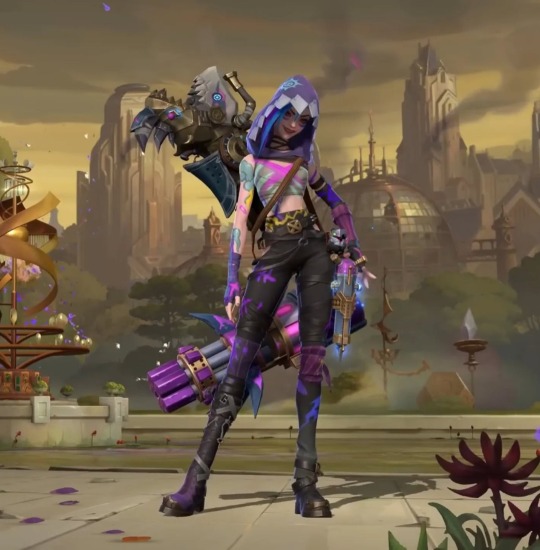
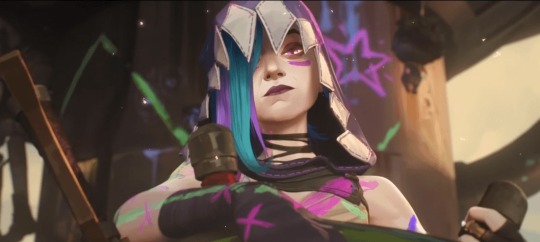
There's a pretty stark difference between Powder and Jinx. The only element they share is gloves, but on Jinx they are modified and have a different color. There are however also similiar "motifs"(?), like purple stripes on clothes, Jinx's belts are positioned in a way that mirrors Powder's blue...thing on her pants; also Powder has a small braid on the side of her head, as well as golden hairpins, while Jinx has two braids that are waaay longer, but she still has golden elements that support her braids.
Now, the differences. Powder's clothes are layered and are made from different fabrics, covering almost her entire body. This represents that she's a shy, frightly girl with very low self-esteem. Jinx, on the other hand, has waaay more open skin, even to a somewhat inappropriate degree. This shows us that she became confident and doesn't care what others think of her, maybe even to a fault. Her boots in some way resemble jester's shoes, showing us her more light-hearted attitude, especially towards violence.
Also, unlike Powder, who only ever shot from a toy gun and made bombs that didn't work, Jinx is a prodigy bomb maker and a master shooter with (what seems like) a hand-made pistol, and on top of that has an also self-made machine gun. So from all of this we can pick up that this is the same person, but she changed in a huge way, hence why even her name is different.
Now, onto the Jinx we see in s2 ep9. She cut off her braids, colored streaks of her hair, especially on the bang, replaced her pants, top, and belts, made herself a hood, painted over her tattoos with x-es and Ekko's symbols, fused her machine gun with Fishbones, her recently made rocket launcher (ignore the wild rift picture for this part), and completely remade her pistol. The only things that carry over from her previous outfit are gloves, boots (which are now fully laced), her necklace aaaand yeah that's it. Motifs are left the same, except for her hair of course.
Now, I want to talk about a couple of elements in detail. Her hood is made from unknown material, and resembles some kind of monster, rather than a monkey, raven or shark, her previously established symbols. Like someone pointed out, it probably resembles drawings on Isha's helmet.
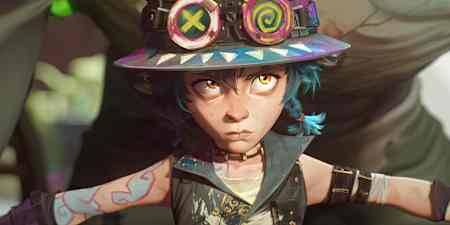
Also Jinx has pink markings under her eyes, just like Powder from Ekko's vision in season 1 ep7.
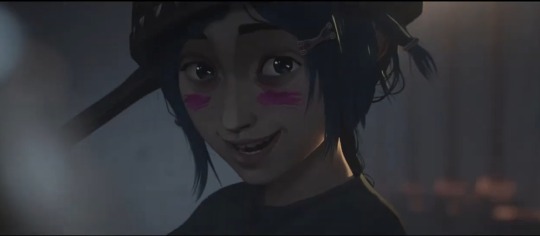
The bandages that replace her top are the same ones Vi has.
So, with all of that information, what can we tell about Jinx at the end of her journey? The obvious answer is that she decided to move on, but in what way? Accepting both "Powder" and "Jinx" parts of her? But then why did she paint over her tattoos? Something permanent, that shows how irreversibly she changed over the years, and will never become the same girl again? Moreover, why didn't she make the new tattoos, pink bullets? Yes yes, pink bullets. Both LoL Jinx and even s2 ep9 skin for Jinx in The Wild Rift have pink bullets tattoos, but arcane Jinx doesn't. Why tho? Well, of course, it's our good ol' pal Silco erasure. Because, you see, Jinx killed Silco with her Pow-Pow, and when she shoots with it, the bullets are seen as pink projectiles. So, not only does Jinx figuratively want to "paint over" her past with Silco, she also in no way wants to capture what she did to him and that in the very same night she finally accepted herself as Jinx. Of course we know that s2 writers didn't want to follow up on this decision, but adding a couple of effects onto her model isn't that big of a job. Anyway
Why did she go back to covering her legs entirely? Is she more careful now, orrr perhaps she seeks protection from someone? No. Why does she have paint all over her, and Ekko's symbols in particular? Is she a part of the Firelights now? Even if that's the case, it was never confirmed on screen. Why did she completely change her haircut, only leaving a bang? I guess hair holds the memories or whatever, so to start a new life you shouldn't have any memories of the previous one? Idk. Why did she replace her top with bandages like Vi's, if the last time they saw each other Jinx told Vi to let her go and forget about her? Idk. Why did she fuse Pow-Pow and Fishbones together? Idk.
The only things I more or less don't question are the hood and markings, but then again, I'm not really happy with the fact that we see Jinx in them in her "last" moments either. That's the part of my biggest problem with all of this, actually. It took around 10 years for Jinx to have such a big difference in how she looks, but the latest change happened literally overnight. No matter how you try to explain this, this is objectively terrible writing. In less than one episode the main character of the series drastically changed her appearance in ways that should tell us about a big character development, but we didn't get a chance to see any of it. Not the process, nor the development itself, because Jinx behaves in ep9 the same way she behaves in the rest of s2.
So, what was that all about? I guess they wanted to fill out the quota of a minimum of two outfit changes per season, but it's in no way justified within the show. And that's why this is a tragedy. Jinx went from the most well-written character in the show with incredible design and conflict to the writer's toy which only function is to be sacrificed.
#also. a real missed opportunity to make Jinx's hood from Silco's coat. ofc the design would need to be changed but i personally don't have#any problem with that. but you already knew that lol#arcane critical#jinx arcane#arcane season 2#arcane#i got so tired while writing this post💀💀💀literally took me several hours#but it's probably my last analysis so i guess it's worth it
157 notes
·
View notes
Text
well i finally made it... here's my episode by episode deep dive into every joplittle moment in the entirety of the terror for all of my fellow joplittle freaks out there. i can't draw or write fiction but i CAN be insane about details :) i did my best to edit this so please forgive me if there's typos or things that don't make sense. and a final note before you start reading- i think i make a point to say this in some instances but it bears repeating at the beginning- i could certainly be wrong about some of these observations as they are largely in the background and usually happen very quickly while something more front facing is happening in the scene. i did my best though!
Episodes 1&2- basically nothing, at the dinner scene in episode 1 we can infer that jopson shuffles behind edward at one point but there’s no onscreen proximity or eye contact. neither of them are in episode 2 at all.
Episode 3: we have one of the joplittle scenes to end all joplittle scenes in this episode. When edward is talking to crozier, blanky, jirv, and hodgson about his fears of netsilik retribution, jopson knocks and walks in the door. When he enters the room, edward immediately stops talking, makes eye contact with him, then starts tugging his jacket down, almost to the point of squirming and fidgeting. Jopson walks into the room making eye contact with edward with the tiniest smile on his face and his eyes are so bright and interesting in this scene. And i think there could be some arguments made that this is just how these two are but i have some additional thoughts- yes edward is an awkward guy but he outranks so many people in that room, jopson most of all, and yet he immediately stops speaking and becomes visibly flustered when jopson walks in. And their eye contact lingers for such a long time before jopson looks to crozier, the person he actually came to address. And just again with how bright jopson’s eyes are and the tiny tiny smile he has on his face when he’s looking at edward that then turns a little more serious when he turns to address crozier. It’s such an interesting scene!
later on when the terror boys are going across the ice to sir john’s funeral, jopson is walking behind edward… he might be looking at him but it’s very hard to tell so i hesitate to even include that instance. HOWEVER during the camera pan when crozier is reading sir john’s eulogy, we see jopson looking up at one point, and then his gaze briefly comes down to the person directly in front of him… which is edward.
Episode 4: When crozier is sitting in the dark drunk and depressed and probably listening to the cranberries and jopson comes in, the script says he shows somebody down the hall five fingers, probably to indicate “give me five minutes”. Since he then says that lieutenant little is asking about the meeting, we can presume they came to see crozier together.
When jopson is giving crozier the headlines of the meeting, the way he talks about what he knows from edward sounds more like it was from an actual conversation they had vs the other two he mentions- he says “mr reid reports” and “lieutenant irving has what sounds like a pressing issue”- both of these expressions imply that he was doing exactly what crozier says he does- hearing everything. but with edward it’s “lieutenant little is wondering, he says/thinks this this and this”. The language used to describe what he knows about what edward will report on is much more direct and familiar. I think ned and jopson were hanging out before they came to see about the meeting with crozier hehe
In the scene where heather gets his shit rocked it’s very hard to keep track of edward and jopson but there is proximity and it’s very possible a few times that they might exchange glances. It certainly seems that when edward goes below decks to arm the men jopson watches him go.
Episode 5 ended up being the most fruitful for pretty clear glances and looks that i had never noticed before
when jopson comes in with the tea tray he and edward look at each other the whole time Jopson is walking to the table to set it down
after Jopson says “consider it done sir” edward watches him as he walks out of the room until crozier stops him, then he looks at crozier
Ned could definitely still be looking as Jopson answers crozier, the line of sight is correct and in the script it specifically says that little has to look away from Jopson (not crozier) as they discuss the whiskey because it makes him so sick that this is being discussed right after talking about hornby’s death
A lot of proximity during the Silna and crozier conversation but I don’t think they look at each other.. Jopson might be looking at Edward when he walks in with silna and he might glance at him when he walks past him after setting the tea tray back down but I’m not sure.
In the script it says that jopson and little exchange a look when crozier says he’ll go to get the alcohol for blanky’s surgery but it looks like it’s him and hodgson looking at each other.. however edward looks at someone offscreen too that would make sense to where jopson is standing at the time. There’s a lot of proximity in that scene where they carry blanky down and set him on the table
Damn that extremely prolonged eye contact when taking the whiskey shots is so interesting too? Especially since it seems like jopson struggles to take the shot.. It seems like he might not drink a lot and that could be for 2 reasons- another callback to historical jopson and him being lashed 30 something times for drunkenness or it could be because of his mother’s addiction which at this point in the story we don’t even know about it. Either one would make sense but if anyone has any ideas please share them
they are right next to each other while blanky gets his leg cut off
In the script it says that jopson brings edward into the room for the meeting with crozier after blanky’s surgery, I believe they are the last two to join but even if not.. interesting for sure.
when crozier stands up to give the whiskey to jopson to pour out, Jopson is looking down but for just a moment before he turns to crozier again he looks at edward
Aaaaaand edward then watches crozier take the last drink of whiskey but then he looks right at Jopson!!!!
When crozier goes to his berth it pans over to Jopson and he eventually looks at ned AGAIN
Ugh I loved this episode because there was truly so much to notice and like it’s there! I need to know why!!
Episode 6: okay we have one of THE joplittle scenes and god fucking bless Liam for his commentary here because there’s just so much to it… like the fact that he’s trying to convey to Edward that things are bad but they will be okay with a single look suggests such a familiarity and closeness and understanding between them because like how would you communicate that with a look to someone that you weren’t on fairly intimate terms with?? (need to make post about other pairs that talk through eye contact in the show, like hickey and tozer). at the very least we have to assume they confide in each other and understand each other to a certain degree and like now we’re slightly straying into delulu land but I love how protective Edward looks when hickey walks over and kinda gets close to jopson lol edward is already watching jopson walk away and he gives hickey this little glare when he realizes hickey is too. also just the simple fact that they were eating together??
When Reid bumps into crozier at carnivale and little tells him to step back he’s looking at jopson and when it cuts to jopson he’s looking back at him
They exchange a glance in the background of crozier reacting to hoar and crispe in the big pot lol
Jopson watches Edward for most of the little clip where crozier is walking away after telling the men to get of the pot
After crozier says they’ll be abandoning the ships and walking Edward looks over at jopson for a long time
When crozier is saying “they are a good people who we can greet as friends” jopson looks over at Edward and looks him up and down twice… that’s 4k babyyyy, that one was crazy
When Stanley sets himself on fire and it cuts to the crowd Edward definitely looks around until he sees jopson in front of him
It’s extremely hard to tell but at one point it looks like ned crozier and jopson are all moving together looking for an exit and ned briefly puts his hand on jopson’s back or at the very least reaches for his back wtffffff
Mmm not sure about this one but in the background of the cleanup scene you can see Edward helping people and it looks like jopson may be with him
Episode 7: ugh the promotion sceeeeene idk what i can say that hasn’t already been said but i will always always always point out that this is the happiest we EVER see Edward in the show, his smile is so huge and throughout the scene he keeps giggling to himself and when he’s still sitting down you can see him kinda do an eyebrow raise thing like “oh my god well I wasn’t expecting that but this is amazing” HE LOVES THAT MAN UUUGH AND THE WAAAAY he looks so fondly at him after he shakes his hand and he just keeps smiling and giggling like everyone is so happy in this scene but Edward is the happiest…
Episode 8: when crozier is yelling at edward for arming the mutiny jopson is turned around watching ned.. Ugh :(
another shot of jopson turning to look at ned before he looks at crozier in this scene
eye contact when Edward walks into the tent where Irving’s body is
definitely some potential eye contact when they’re asking hodgson to confirm that hickey lied
jopson watches Edward when he’s explaining why they shouldn’t trust the marines
edward is looking at jopson right before crozier says to find the carpenters
Episode 9: what i believe is the last joplittle scene…. god it’s so rough. I feel like jopson is so hurt because he knows his time is coming and i feel like Edward thinks everyone in that tent including jopson will be able to continue to haul south… ugh and then jopson just stares Edward down the whole time when dundy starts talking :(
Episode 10: when edward is walking to the tent to address the men his gaze lingers on the sick tent where jopson is now…
i also find it very interesting that he was all about going south and leaving the sick behind in episode 9 but completely changes his tune now- i know that this has to do with saving crozier but he makes such a strong argument for not leaving the ill behind (although he of course obviously somehow does) that it makes me wonder if jopson had anything to do with that.. like a big difference between when they first made the proposal and now is that jopson could still haul when they suggested it before but he can’t now
And his reasonings point to jopson a lot too- “9 so ill they can’t walk, only 2 able bodied lieutenants” like he was thinking of him!!
and one last fucking thing before I fucking die- edward’s last word “close?” mirrors some of jopson’s first- “we’re close sir”.. They are the last two to be found by crozier, two of the men who saw almost everything and died last… ugh.
Final thoughts: i will constantly make the argument that when it comes to the terror, absolutely nothing is on accident. Nothing. Some of the scenes i described can certainly be debated but the simple fact is, edward and jopson spend a lot of their scenes together exchanging looks and watching each other. It is safe to assume based on their roles that they must share at least a small amount of familiarity but i think that these shared glances suggest a deeper connection. They seem to be able to communicate seamlessly without ever really speaking to one another and when they aren’t communicating through their eyes, they are still watching each other in shared scenarios. I would love to know more about whether this was just how liam and matthew chose to act their dynamic or if there’s more to say about them. Either way i’m going to keep being delusional about them because i love them together and i think there’s ample evidence to prove that they are more familiar than we might realize
181 notes
·
View notes
Text
CB theories/thoughts (part 1)
One of the things I love about CB is how the story immerses its reader into the story and makes them discover for themselves what is happening, watching it unfold and learning things along with Chase. The story is done in a way that it doesn't spoon feed you the information. It gives you the pieces and you have to put them together. There are so many details that can go unnoticed,but they can be crucial to the plot.
I am really interested in Nox cause he is the biggest mystery to me so far in the series. The guy is such an enigma,we know him but we don't know ABOUT HIM. Much like Chase.
I would like to point out that this is the first time that Nox saw Chase,he didn't look as aggressive as the first time he interacted with Chase,but he does seem to be under pressure.


Nox said that he has to get back THAT KEY, talking about Silver as she is an item? Why would he do that when he is a key himself? I did think of the possibility that he was human at first and became a key at some point later in the story,but I now doubt it. Mainly because he has known since the start how every story goes by the time he enters it and that's a trait the keys have. Plus, if he has been a key this whole time, the whole narrative makes more sense. It is interesting how Nox said "something is missing" and not "the key is missing" maybe because Silver is not what was missing or she is not the only thing missing. She did come with a torn paper that has instructions and we do see a book with a missing page. The page Chase found seems to fit,it is just that Chase is reading the other side of it,but the torn pieces seem to fit.


The questions that are arise are the following.
Was it Nox that torn the page?
Who put Silver and the page in the library?
Why was silver cracked?
Was silver intended to be found by someone specific?
Was it Nox that torn the page?/ Who put Silver and the page in the library? If we look at the handwriting in the "read me" book it seems a bit sloppy. I think this is the kind of letters someone would have while trying to write in a hurry or fit a sentence in a small space. Or maybe these are the kind of letters of someone using a bigger pen than their size to write. I am giggling so much at the thought that Nox is actually living in some secret room under the library, and under some toy story-like operation, he managed to put the book in the library. The book was found after all on the lowest bookshelf and the only reason Chase noticed it was because he was lying on the floor. It is safe to assume that whoever has Nox and the keys are close to Sugar springs since two other keys were found there.


Why was Silver cracked? I honestly have no idea,I am not creative enough for that. All I can think of right now is that the last time she was in a book something went wrong. As I have said in another post, I don't think ex libris is active anymore cause whoever is that old man,he doesn't seem to fit the profile of Ex libris. In a previous post, I said that Nox and Violet do not seem strictly supervised and Nox is not forced to retrieve the keys as the old man doesn't seem to know of Silver's absence or even care. It is possible that he didn't know that her crack could be fixed so Nox saw it as an opportunity to sneak her out.
Was silver intended to be found by someone specific? Maybe, maybe not. Nox does say ‘’after all that and it is just a small weak little thing like you’’ which could mean that he did not know who was supposed to find Silver, or maybe he was looking for a candidate that he deemed worthy of including in his plans. I don’t think there is enough information to draw a clear conclusion for that question to be answered.
Bonus detail: Nox likes to hide between trees and leaves and that's where he was hiding the first time he saw Chase. When Bronze entered we see a rustle of leaves, implying that Nox did enter the book for a moment.




I am thinking of making this a series of posts where I just overthink everything and I make silly theories cause I need season 2 asap and I feel a great urge to yap.
102 notes
·
View notes
Text
single mom x price; PART 2
AO3 VERSION
part one || part three || part four

“Please. Be good, alright?”
You look down at your son. He holds his bear close to his chest; defensive, as you sense—you almost sigh at this view. He’s in a bad moment. The moment where he needs no one, but his mom and the cuddles that you normally would give him, if the nanny wouldn’t be on her way.
And it’s his favorite nanny.
You’re reluctant to let him stay in the house, considering not only his humor, but the earlier tantrum that he gave you. Something between “you’re the worst mother ever”—which only gives you an eye roll, but it’s a potential theme for a cry session later on—and “i don’t want anyone else but you”.
Normally, you’d call your mother that loves him to the core, but given that she’s in Hawaii, not really reachable for you and possibly not in the mood to listen to your problems. She only wants to do it when she’s bored, and if she can give you her “golden advice” without a chance of being cut off by you putting a phone away because she crossed a line.
Which happened too many times in the past, since she just absolutely adored engaging in your life. Reminding you every time that you are responsible for the position you found yourself in and the only thing that could possibly save you is listening to her. Marrying the man that she gets to pick.
Because the mother knows best, as she always says.
The irony of beefing with your son is irritating for you too; especially that you need a nanny for an hour, maybe a little more because you need to go to the town meeting. You could skip it, sure, but it’s like skipping an opportunity; and who knows what will happen. Maybe you’ll get around doing something that will bring money, if they will talk about the spring festival.
Last year you got yourself quite a deal, so the thought is exciting enough for you.
The possibility of meeting John is thrilling, too, even if you don’t want to admit it directly. Everything about this man is electric, enticing enough for you to barely be able to think around him. Something is tingling in your chest, when you think about it. He’s acclimatizing well enough in town too, as you learned—and the town meeting is a good chance to see with whom he’s close.
Animal in a zoo, it would be a good comparison, even if it seems cruel for some reason because John is anything but it.
You get to leave the house after five minutes of talking with your nanny. She’s like an angel, considering that she convinced you to leave, telling you that she’s gonna do alright with your son and his tantrums aren’t really the worst thing that happened in her career.
Which, oddly enough, you believe, without even knowing the details.
You sit in the second row at the meeting. Arms crossed, maybe a little defensive, but you’re not opposed to talking with people that sit near you. They show you photos, talk about their family, ask kindly about yours, until someone mentions a husband when you tell them about a situation from days ago.
Normally, you’d probably make a snarky remark about their comment, saying something how rude it is to point to someone that they need a man, when your point isn’t missing someone to help you around.
That’s normally, if your ears wouldn’t catch that voice. The voice that’s hard to forget even if you’d desperately try to do it. Deep, drawing attention to the owner immediately, like a moth to a flame because the desire to look is impossible to resist. Everyone knows that the appearance does the magic, but if the voice is attractive, most likely is the one who has it.
And that’s exactly John Price.
You observe him only with a corner of your eye, assured that if you’re gonna glance at him once then he’s gonna know where you are. It’s like the seventh sense of his, probably acquired after his job, at least you think that’s the case.
You don’t need that. What you actually want, need, is a small dose of mystery that you currently have without him knowing you’re here.
Maybe that’s not fair, but you don’t care.
He talks mostly with guys from the local workshop; they vigorously explain something to him and he nods. Listens, then responds in such a different mannerism that they represent. Calmer, more stoic, yet it can’t be mistaken with indifference. He’s just… thinking type, you assume. The one who calculates before taking any action.
Wise man, so to speak.
Besides the boring stuff at the community meeting, there’s just one thing that could potentially interest you in—competition for the best garden in town. It has everyone gossiping there and there in a deep hope, or strategies what to do to earn a win; mostly those successful, straight out of family movie moms, ideal moms who are doing everything for their families. Chit-chatter about flowers, techniques and stuff disrupts everything enough to make a meeting come to an end. There’s no point in continuing, when no one listens.
You aren’t even considering the competition, but it gets you enough to think of renovating your garden. Forgotten long ago, as it needed too much work when you had a small kid; right now, when your son is six, there’s way more opportunities for you to actually try to tend it. Who knows, maybe spring is the best time for that.
“So. Gonna snatch that first place reward?” You almost jump, when you feel a hand on your hip. Light touch, but waking you up from your thoughts enough to acknowledge how tender it is. Allowing you to back off easily, if you’d feel like it’s too much.
But you know who this is. And you somehow know that it’s not too much.
“I wish,” you laugh dryly, looking finally at John. He arches an eyebrow, then proceeds to walk back to back with you, no hesitation in his moves whatsoever. “Not really a gardener. Besides, knowing how my garden looks right now… Not really a chance, no.”
There’s a second of silence. “Could help you with that,” he says, fixing his shirt; you give him a quick glance. His outfit isn't really different from the other times. Simple flannel, worn out jeans, combat boots and this well-known, plastered smile into his lips. Charming and dangerous, you think. “I have time, if you really want it.”
You clear your throat, conflicted. Do you really care that much about possibly winning a contest? Maybe John’s help would really do wonders, considering that he already helped a lot of people in the neighborhood; with success that didn’t take much time, as you know.
Kind, nice, doesn’t want anything else in return; could work for you for free. You’re 99% sure that you would bake him a pie or something anyway, but the thought you wouldn’t have trouble with payment is nice enough.
“Maybe. I need to think about it.” He raises his eyebrow, but doesn’t say anything. Instead, he just nods his head in an understanding manner.
“We’ll exchange numbers, then. It’ll be easier,” John announces, giving you his phone. You look at him, dumbstruck—it wasn’t exactly your plan to do this.
“I don’t— Well, I don’t think it’s necessary—”
He barks a laugh, shaking his head. “Nonsense. Come on.” Price smiles; like an angel, truly. Angel in a disguise of a tempting devil because you enter your number into his contacts, even if you wanted to keep it as a secret a little bit more. “Wasn’t so hard, was it? Didn’t think I’m some kind of a creep, did you?”
Your face flushes with pure red, when he implies that. “No! No. I’m just… I don’t use a phone often,” you croak. White lie that don't really need much explanation from you.
“That right,” he muses, possibly amused with your hurried talk. “I’ll call you in a few, then.”
He sticks to his promise, as you learn over the next few days.
The thing is: you don’t pick up.
It’s not like you do it on purpose. At least, that’s what you tell yourself when you see a few missed calls on the phone, the moment you come back from the grocery store. Or, when you’re out in the garden with your kid, planning how it’s gonna change in the future because you’re just taken-aback by how bad it looks. Like it’s not your garden.
Maybe the problem is your lack of courage to call him, too. It would take one click and you’d be done with the task, but somehow, you can’t bring yourself to it. Mixed feelings and the “I can take care of anything” mindset doesn’t help you much.
It feels like a reminder to call back, when you see John outside. He’s in the middle of a discussion with some teenagers that were screaming earlier, disrupting the precious night silence. You thank him in mind that you don’t have to do it—as you got up from bed only for this—you just observe everything behind your window, wrapped in a fluffy robe. You can’t miss the drama, even if it means that you’ll lose a few minutes of your sleep.
Your humor gets better automatically, as you even laugh at how disappointed they seem, going straight up to their homes.
And then, you cross gazes with him.
There’s a faint smile from John. He raises his hand, greeting you, so you do the same. However, the difference in moves is clear. John does it slowly, you almost rush to do it and disappear into your bedroom, so he won’t get an idea that you’re up for a talk.
Because you’re not. You’re too tired to do that, to talk with a man that makes a pretty mess in your head every time you’re around him. And, you’re way too ashamed to do that when he called you multiple times and you haven’t answered even a single one of it.
Some part of you wants to give in and text him right after you see him, but you let this idea flow by. You’re gonna text him at the right moment, you think. The middle of the day, or when you’re gonna see that he works over something, so he won’t be able to read it right away.
You forget about your declaration soon enough. Way too caught up with balancing between home, work and school, you don’t quite realize that the longer you’ll extend the whole thing, the longer it will be over your head.
On Monday, you’re reminded. At first, you don’t really acknowledge it, too irritated that you can’t move your car because someone decided to park behind you, blocking your way. The only thing that keeps you from screaming is your son that does not really care what’s going on. He just sits in the back, playing with his toys, unbothered.
The realization of whose car it is, overwhelms you completely in one moment. You know whose car it is. It’s hard not to, really, when you think about it: there’s only one pick up truck around. The neighborhood is full with families that prefer—most definitely—a car more efficient, a car that has more seats because that’s the only way everyone will fit and ride for football games and all that shit.
The thought you have to ask him out of all people, gives you a migraine.
It’s an awkward thought; the way you have to say something. You haven’t returned any of his calls, treating him like some one night stand (even if it wasn’t the case because you never slept together), and now you want him to move his car. Theoretically speaking, he should do it without even thinking twice.
You can’t help but wonder though, if he’s even gonna acknowledge your plea, given you ignored the shit out of him.
Rude, you think. You’re rude and you did nothing about the calls. About the proposition. You totally ignored John Price, and now you’re embarrassed because you have to ask him something. Maybe if you’d think of calling him back, you wouldn’t even be stressed about this situation. Quick text to him, and there he is, moving his car.
In another lifetime, though. In this, you have to do something else.
After you tell your kid you’re gonna be back in a second, you decide to test your luck and jog into his house, just a few meters away, knocking with a whole monologue in your head. How you need him to move your car because your kid needs to go to school. How you need it to go to the grocery store, you even think of giving him an excuse that you need to go to your mom, even if it’s a straight up lie.
You don’t have to wait long. Door swings open a few seconds later and you can see John, a little bit sleepy and confused—possibly because no one normally wants to see someone at seven in the morning.
He speaks before you have a chance to do it. “So eager to apologize, eh?”
It takes you a few seconds before you stare into his eyes, instead of his chest. “Excuse me?” You blink several times. It’s not like you didn’t understand what he said, it’s just his body that you pay too much attention to. He has no shirt on himself, his sweats low on his hips. Tempting.
You do not look lower than that, for the sake of your sanity. No time for fantasies—and it seems like he knows what you’re thinking, as he smirks with that annoying smugness that he has.
“You haven’t returned my calls,” he says, voice low. Might be the consequence of just waking up, but you think of it as seductive. You’re not gonna rub it into his face though, when he literally has the upper hand in this situation. Wouldn’t be smart. “Thought you’re here ‘cause of it.”
You clear your throat. He’s not wrong, but he’s not right either. “Yeah. We’ll talk about this later, but could you—”
“Why?” John tilts his head. It doesn’t help your case in any way. “We have time, you came here early. Might as well—”
“There’s… a lot going on,” you blurt out, interrupting. You don’t really know if he believes you or not, but he certainly is interested in why. So, before he has the chance to say that, you speak up again, "And you have to move your car first.”
“A lot? You know that I offered to help if something’s too much, right?”
You forget how to breathe for a minute. His tone is hard, a sheer contrast to playful John that was here just a minute ago. Not quite scary, since it doesn’t even sound like a threat, but it is a reminder. Urgent one. “I know, but—"
“None of that. If you need something, you call me.”
“Right now, I need you to fix your car.” Comes out a little bit aggressive. It has Price raising an eyebrow.
“My car seems perfectly good, why would I do that?" John leans against the door frame, looking down at you. You're pretty sure you've never felt smaller than you do now.
Using his advantage to intimidate you is smart. Something that he’s gonna do, if you’re gonna show him that you’re weak for it.
You cough. Trying to be civil here is a necessity, you think. Especially if you actively ignored him before. "Thing is, you blocked my car," you try to explain—calmly, before you run away from him; you even point at your red Mazda, a late birthday gift from your grandfather. "I have to… drive my son to his school."
"I did?" he raises his eyebrow. For a minute, his eyes are off you, attention on the parking lot, trying to search for the problem. Then, he looks at you again. "Mm. Seems perfectly fine to me, love.”
Love. He does it to annoy you, that’s the only reason why he’s so unfazed. Or, he’s trying to achieve something different, but for now, you can’t think straight when this man—half naked man, to be exact—blocks your car’s way, looking good.
Too good.
“I can’t move in any way. You’re… too close.”
“Too close? Could say this sooner—”
“—too close with your car, I mean,” you add, weakly. Price has you stepping on your tiptoes, so careful with picking your words. Precise what you mean because if you’re not gonna do it, he could take advantage and change the meaning.
He chuckles, his smile widening. If he’d be anyone else, you’d think that is a predator move. “Makin’ you all nervous and stressed. Why? Am I this scary, love?”
Again. Again this pet name.
“Just— Can you, please, move your car?” you ask, massaging your temples. He makes you weak in the knees and irritated at the same time; you don’t even acknowledge the steps forward that he makes.
He gets your attention the moment he tips your chin up. This feeling itself is making your stomach jump; skin sizzles with that specific need, deep in your heart that you rather not admit, but it is there. It is there, and John makes it difficult not to melt into a puddle in his hands. Ridiculously warm hands on your skin, to add.
The comfort he brings wraps around you tight like a blanket in particularly cold mornings. Important, needed even, especially in fragile moments. You almost forgot how it feels.
“What car is it? Red mazda?” He breaks eye contact with you for a second to glance once again at the parking lot.
“Yeah.”
He locks his eyes with you again. “Oh, honey. Should say that sooner”
There’s a storm happening inside your head; a strange type of deja vu falls on you like a tsunami wave; unexpected and cruel in some way. Did you not tell him what car is it? That's why he acted funny, so cocky, not taking you seriously? You’re sure you pointed in the right direction, even if you didn’t tell him what car it was. He looked here.
Or maybe he didn't? Why would he lie, though? You might as well be tired, you think. It’s not easy to be a single mom, to balance everything out.
Right?
Storm inside your head makes you ignore the warm feeling in your stomach, when John guides you to the parking lot with his big hand on the small of your back.
“I'm sorry.”
"It's okay. Nothing, really," you gulp. "You're new here, so you might not know my car."
Even if you’re sure you pointed him the direction of it.
“Could know better,” he hums, caressing your clothed skin. Tenderly, afraid to break you in any means. “So, so sorry. Really. And look, now because of me you have to put up with being late. Came home later than usual… If I saw all of that, I’d find a different spot.”
You smile a little, pleased with his explanation. There’s nothing wrong in your mind about this situation, nothing that could indicate that he’s lying. Even if he’s a little too close for comfort, you think it’s because that’s who he is.
He moves his car quickly, while you talk to your kid; he almost didn’t notice your disappearance, too interested in his toys. Even if you want desperately to listen, your brain is too occupied with the previous situation, with Price looking so good without a shirt.
Your son tells you about the “drama” between the elephant and monkey when John comes back into the picture, right before you are about to reverse.
“Everythin’ good now? Nothing else to take care of?”
“Everything’s alright.” You give him another smile. “Thank you, John.”
“No problem.” He glances at your kid, then, back at you. “We’ll have to talk later. About the garden.”
“Yeah. Yeah, we’ll have to.”

#captain john price x reader#john price x reader#cod x reader#x reader#call of duty fanfic#john price x you#captain price x reader#captain price x you#john price x y/n#john price imagines#price x reader#price x you#single mom reader
485 notes
·
View notes
Text












another post for @bttfjanaury! this one's @itsthemorph's mermarty au and very predictably i got carried away with it LMAO.
yap session and bonus stuff below the cut:
once again i came up with an entire backstory for this au, and if i were a fanfiction writer i would genuinely consider writing it since it's a lot less visually comedic than the weredoc au (and comedic in general, it's played a little straighter than "man turns into dog and is thoroughly inconvenienced by it") (unfortunate [in reference to visuals] bc i enjoy drawing mermarty a great deal more than weredoc GBJKGJ) bc i really like the premise but i'm pretty bad at fleshing out a narrative in enough detail to last the whole story so bullet points it is:
doc has decided to take a break from his time-travel-related research and go on vacation! the fresh coastal air might jostle a couple ideas into place, and while he is a nuclear physicist and not a marine biologist he wouldn't mind checking out some of the local aquatic life
and by local aquatic life he meant like normal fish and stuff. a nice mollusk or two even. so when he ends up fishing an entire boy out of the water instead he's understandably very shocked
before doc can move past the "where did he come from??" thought to register his more fish-like qualities, the boy makes a run (a swim?) for it. fortunately or unfortunately for doc, he ends up being able to register the fish-like qualities after all since he gets dragged into the water along with him. the moment doesn't last too long, though, and the fish-boy is gone as soon as doc realizes the guy has a fish tail instead of legs
doc gets back on the dock (haha), thinks about the whole ordeal for a bit, and decides that the best course of action is just to assume he hallucinated the whole thing in a fit of heatstroke or something like that. he's here to relax and get his thoughts in order so he can continue working on his time machine! there's no time to investigate fairy-tale creatures or whatever supposedly living off the coast of california!
it's not shown in the comic but i imagine doc has a little portable radio next to him as he was fishing, so some time passes before he catches a glimpse of something shining in the water underneath the dock
he looks through the cracks in the dock and lo and behold, it's the same boy from earlier! doc greets him, and the boy immediately disappears under the water. doc thinks he's scared him off until a few minutes later where he pokes his head out and says hi back
they get to chatting and doc learns a couple things:
1. his name is marty!
2. he was trying to get doc to realize that he forgot to put bait on his hook but got his hand caught on it, and was trying to get his hand unstuck from the hook without ripping it open before doc ever had the chance to see him, which he obviously failed at
3. both the being seen and ripping his hand open, because in his haste to get away after being seen by doc he ended up doing that anyways. so there's like a lot of blood coming out of his hand now? but like don't worry about it. it'll be fine. he thinks.
4. he really likes whatever it is that's playing on the radio
doc insists on patching up his hand and initially marty refuses but lets him do it eventually, and marty tells doc that for a land dweller he's actually surprisingly nice. doc says nah anyone would want to help out someone hurt, especially if they're the one's who caused it. and marty's kind of confused by that because his family's always warned him of how dangerous humans are, which he kind of never thought too hard about until now where his time off this particular coast has really proven them correct, because he's encountered a bunch of humans over the past couple weeks and they've all tried to kill him or catch him. doc's the only one who's actually bothered to say hi!
after learning that particular not-at-all-concerning tidbit, doc asks him to elaborate because there's a lot to unpack over there, but someone else walks onto the dock before marty can get a word in and he takes off
marty does not return, even once the other guy leaves, and when doc packs it up to return to the place he rented out for the vacation he overhears a conversation among a group of men about spotting something weird in the water earlier and that it kind of looked like a mermaid? and that if any of them manage to catch it they'll all be rich as thieves. and another guy in the convo goes no you're thinking of rich as kings, you're mixing it up with a different analogy. and the first guy goes no i'm not i said what i said
so now this vacation is doing anything but clearing doc's mind. he's really worried about that little fish guy
there's a couple more ideas i had but halfway through writing out this bullet list i've realized that if i were to actually write this as a fanfiction, i'd probably want to keep those a surprise. so what i just wrote out is kind of the equivalent of one chapter
edit after thinking about it a bit more: since most humans have been trying to kill him, marty really has no incentive to let a guy know that he's wasting his time fishing with a baitless hook. so a. he's still pretty optimistic that most humans aren't out to get him, even if his experience off this particular coast says otherwise, so he was trying to be nice anyway or b. (which i think is a lot funnier) he has started to pull on people's lines as a way to fuck with them. i think if i wrote this i'd change it to this one
i based mermarty off of a guppy fish! specifically this kind of guppy fish:
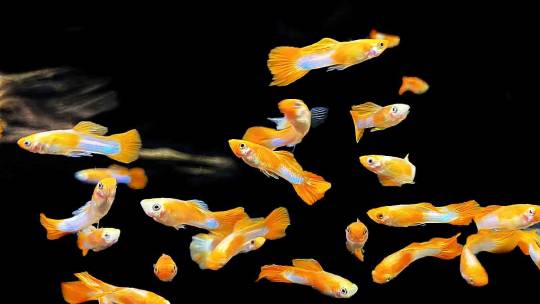
i was searching up kinds of fish and he just had the vibe of this thing. although now i think i should've made him a flying fish instead. for the pun
alternate ending to the mini comic:

the other one makes a little more sense since just approaching a guy whose species doesn't know about your existence unprompted is pretty stupid even for marty (and also i thought it was funny that the hook didn't have anything but doc ends up catching something anyways) but i still think this one's funny too
#back to the future#bttf#bttf fanart#marty mcfly#doc brown#emmett brown#what's with me and animal related bttf au's this is like the third/fourth time#first being weredoc second being the penguin picture and third being this bit we came up with on discord where everything was the same#except doc was a horse LMAO#i spent so long coloring mermarty and i have no regrets. very fun to draw the fish. 10/10 would reccommend#scratching my brain thinking of how i can make the plot of bttf still happen if marty's a fish#“and then back to the future happens” is my favorite bit about these kinds of aus gbkjgbjkg#maybe doc builds the flux capacitor into a speedboat or something#the mcflys are all fish but biff and jennifer are human in this version of the au. just to let you know#needles is a pufferfish. not like this will come up at all ever but i felt the need to share that#“his ass is not binding properly” could refer to most versions of marty i think#i can't believe that a mermaid au of bttf being my first piece of written fanfiction is more plausible than not at this point#such is life i guess.#kit does an art#kit yap session#tag as ship and i feed you to the sharks. they don't normally eat people but there's exceptions to be made i think#mermarty au
81 notes
·
View notes
Text
Arcane Season 2
Lately, I've seen a lot of content creators and people online reacting and talking about Arcane season 2 in a negative way, to the point where they say that the season was trash. And honestly it makes me mad. If the ending of the story, or the story itself wasn't your cup of tea, is okay. Media enjoyment and appreciation is subjective, however, we can all be objective when it comes to the actual content of said media...and that is what has me so disappointed on their takes, because their reviews (that I came across with) are flat out lacked on media literacy and did not entirely understand the source material they were reviewing.
Let's start with the character arcs...in my honest opinion. THEY WERE GOOD. ALL OF THEM. I feel like a lot of people are exaggerating when it came to the arcs (especially Vi, Jinx and Caitlyn's) saying that they were not developed enough like in the first season, but I disagree. Most of their arcs for season 2 were HEAVLY hinted and foreshadowed in season 1, mostly Jinx's and Cait's.
One of the arc that gets more hate is Vi's, and is because of the s3x scene of season 2 episode 8 and the finale of season 2 episode 9, and overall season 1. As well as her forgiveness towards Caitlyn and how she acted selfishly in that episode. However, they don't take into account 2 things: 1. Vi is heartbroken (for what it feels the 30th time in both seasons) because Jinx/Powder tears and rejects Vi's help and unconditional love (Vi's fatal flaw is not knowing when to drop the towel, and establishing boundaries for herself, believe me, I learned that THE HARD WAY ) .
2. Vi and Caitlyn might not have enough time to talk about their feelings as deeply as they would've liked (a literal WAR is coming) so, they did it in the most raw and truthful form of love language, touch and eyes. No words, they weren't needed either.
Don't blame her for doing what it felt right in the moment, also let's be real here. Jinx gave her consent, and decided to leave Vi (Vi doesn't know the context, we do), for her sibling's benefit and love for her, because it hurts to Jinx that Vi is not taking care of herself and not pursuing what she truly wants, which is Caitlyn.
Was it in the worst moment of Jinx deteriorating mind? Yes. Was it out of place?...Maybe. But, was it necessary for the plot? OBVIOUSLY.
The s3x scene holds and magnifies the arcs of the couple and their vulnerability (Vi taking the leap and show her feelings, and Caitlyn responding and being truthful of hers). There are videos that explain the importance and the weight that holds in the arcs of Caitlyn and Violet, way in depth and detailed. They all point out the symbols and meanings of their gestures, which are wonderful. And ties together their bond and their strengths. As a younger sibling, strangely enough, I connect with Vi more than Jinx. That is because of the parental and family expectations that they have on me. I had to take a role of being the caretaker since "I'm more mentally stable". So I understand why Vi is the way she is.
Therefore, I understand and relate to Vi wanting to be selfish for once, without feeling guilty about it later. Not having regrets.
I recently rewatched both seasons and I have to say, it all played out perfectly, including the finale. And it payed off to all the build up in season 1, because of the foreshadows and plot devices used in both seasons to tell the story. The plot points and story arcs were very good, especially since they all connected to the main theme, which is forgiveness. Where do you draw the line in where there is nothing left to forgive or how far are you willing to do so. The plots truly showcased what is Arcane (narratively and character) and how does storytelling (mostly subtext, non-verbal and visual ) actually work. The way the writers handled it was MAGNIFICENT and TRAGIC. Which serves right for the story they conveyed in the series.
I think, one of the reasons that this season was received poorly (compared to season 1) is due to the already constructed ending and story lines that we might have thought of. Which might have more things or less than the main series but it was something to cling on before the premiere of the last season. And because of it, they judge it extremely and harshly without actually taking into account what the story was actually about. Would it have benefited of more episodes? No. Would it have benefited of more runtime? in some things, yes but at the same time, i don't mind it and I believe that it is good. Would it have been better if there was another season to wrap up the story? Definitely not. That is due to the story being pretty much a solid story with a few strong undertones that have unfolded before its finale. I LOVE Arcane, and I would watch it again and again (both seasons). I think, it is one of the biggest series of all time and also the most compelling one in modern media). This final season brought me to tears and this hollow feeling in my chest yet satisfied by the way it ended the main journey of Runeterra, and opened to many more.
Also controversial opinion, but I like season 2 a lot more than season 1. And that is because, I love the development of it (the show of progression and how it embraces the themes showed on the series)
BTW, THE MUSIC SLAPS. BEST OST HANDS DOWN MIC DROP!!!!!!
(P.S. As an english literature major, I might have more insight on this but don't be afraid to disagree/agree in the comments)
I want to know how y'all felt and if you want to ask me something or debate this, you're free to do so. I hope I can create a save space for all types of convos about this show.
love,
~lovely References:
https://youtu.be/dRvgb_CB9Ss?si=rQGmpPAYL5XrDR1u https://youtu.be/LZ6szm2fmB4?si=k7l-OuE018PpctjM https://youtu.be/0nhTS9-P7eQ?si=MkMntcyQZTHPzgYZ https://youtu.be/l0-We7fyCaQ?si=aP-fhcWxSspphBT-https://youtu.be/sIJEQjMqiNA?si=xF8rt77LKAG0Kpp6 https://youtu.be/NtDGwZxQyio?si=ZTKq1E2VetcXkyis https://youtu.be/30zVFfziBuk?si=AQpE6cntutdQvBfz https://youtu.be/9Lro6HmaWiA?si=PxPq4U8s138nlHw4. https://youtu.be/W3cNewkYB8o?si=LsyGnzC3iaMpr7K1 https://youtu.be/nD9cNowdBQg?si=jxqwX1tmuunnZpHi

#arcane#vi#caitlyn kiramman#jinx#arcane s2 spoilers#arcane season 2#arcane jayce#caitvi#caitlyn arcane
66 notes
·
View notes
Text
Echo asking for Reg Manuals early on in his deployment with the Batch wanting desperately for normality. Only to find out that his shitty little brothers cannot care for anything. ever.
Hunter sheepishly hands his over and Echo just stares at it, watches the drool drip from a bite mark in the cover and goes "What the fuck did you do to it." and Hunter mumbles "I was hungry."
Never asking Hunter for anything again, then.
Wrecker looks at Echo like he grew another head and yells: "TECH, WHA'S A REG MANUAL?" which gives Echo all he needs, really. His disappointment turns to "what the SHIT" when Tech oh so calmly points to the very much ruined and indented copy of the Reg Manual that is currently the ONLY thing holding up Wrecker's bunk leg.
The brawler laughs while explaining how THAT happened while Echo tries to figure out why they didn't just.... fix the leg.......
Crosshair doesn't even say anything, just points across to where his is pinned to the wall, blaster bolts shot through the book as it's open on a diagram of a trooper. It was MEANT to display armour, but Crosshair wanted to practice for mess fights.
Echo simply sighs. Because of course he would do that.
Tech, thank the MAKER, hands Echo his Reg Manual and it's completely and utterly pristine. Echo nearly cried with joy, and Tech very expertly dodges his bone-crushing hug of thanks. He just asked for it back later.
Echo plops down in his hammock, ready to kick back and take a much needed trip down memory lane...
....only to find Tech's neat scribe COVERING the pages.
It's fine, Echo swears as he tries to read past it. Just, it's a bit hard when Tech's made so many damn corrections, pointing out errors Echo had seen himself so many times, his writing so lovely and so well tucked to the margins that Echo mistakes it for the actual text.
The deeper he goes, the bigger the notes, and on the blank pages at the front and back, Echo notices the rest of the batch scribbled and drew for each other, obviously following Tech's strict guide to not writing on the actual pages themselves.
It's.. kind of cute, actually.
Its sweet, just how much personality Echo can see in the few messy hearts Wrecker dotted along the sides, or the small reminders Hunter jotted down, for himself and for Tech. The stickman with the crosshair shooting another, goggled stickman doesn't go unnoticed, either, but the date indicates that its been years since that drawing.
At the very end, Echo's forgotten to be so upset at how defiled his usual precious Regs are, instead finding himself smiling at the drawings he found, hidden between pages. To be fair, its mostly plants, diagrams- but Echo can see Tech's handiwork in the messy drawings of Hunter, Crosshair, and Wrecker. They're younger, but it's them.
Tech didn't sign the drawing, but the attention to detail makes it rather obvious who was responsible. Echo smiles, tucking the page back lovingly to its spot, and returning the Regs with care.
Tech doesn't mention it. Echo doesn't, either. He borrows it some more, and mourns its loss when Kamino disappears.
#uh anyways they make me weep#sw the bad batch#tbb tech#tbb crosshair#tbb wrecker#tbb hunter#tbb echo#i love echo learning about his brothers through watching them... its kinda sweet
161 notes
·
View notes
Note
Hello Bluebell! I LOVE your art style! It’s mesmerizing! As an autistic person, I enjoy submas thoroughly, and your content brings a smile to my face! So if you don’t mind, here’s a mindless rant about your fnaf au(I’m not even that big of a fnaf fan, your art is just that good)
None of the other animatronics are really allowed to interact with the twins, and they only us the transport when needed to move through the pizzaplex without being spotted. The twins are used to aid with the transport of of items(which is why they are so tall and bulky. Why hire staff to move work items around the place when you can use scrap to build animatronics for cheap that you don’t have to pay) they are beloved by the behind the scenes workers, and especially the engineers/mechanics. The twins are active 24/7, and can receive minor charge through their feet via the floor. When not moving people or work items, they patrol the warehouse area to ensure no intruders. Despite appearances, they love children and carry various candy/merch to give to them. When controlled by the virus, ingo acts as a lure due to his voice box, and he uses his booming voice to stun victims. Emmett is the one who catches the intruders due to his better movement. The victims are often taken to vanny, and in this state they believe they are helping a lost child find their way home. They are unaware they are dooming them to a worse fate. Both twins are semi fixable using parts you find scattered randomly around the plex and hidden details in the repair area. If both are recruited as allies they will defend you against music man and guide you through the subway tunnels to avoid detection. They get really messed up in the music man altercation, and when elesa and company come across them, the damage is too extensive to repair them both separately, so they are temporarily combined into an amalgam of both twins. They maintain their individual personalities and return to help the player in the burntrap fight. They lead the group out of the burning pizza plex. This is only unlocked if both are saved and allied. If only one is allied the other will become hyper aggressive and will become incredibly dangerous; Afton has complete control over them. If neither are rescued they wander the area under the pizza plex in search of their counterpart. They later return as enemies as you make your way down to the cellar in this version. They will ambush the player if they leave Freddy for too long. Their state is greatly deteriorated and they at this point are mindless murder drones. Anyways that’s all for now! Have a marvelous day!
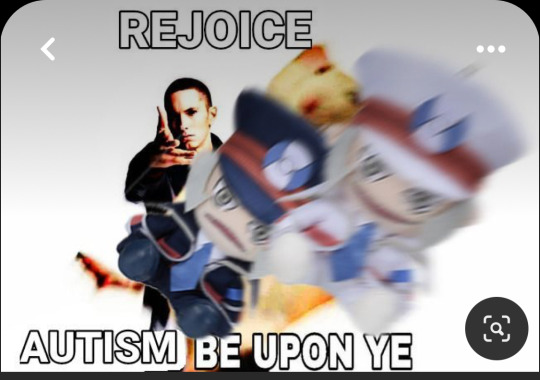
First of all, thank you so much. I'm so happy you enjoy my fnaf submas AU so much >w<
And sorry for taking so long. I tend to gather asks until one day I actually answer them.
I am reading your idea with great interest, oh my~!

It's very different from what I'm imagining them as, but that's not a bad thing at all!
Using them more as working bots, instead of entertainment, is a great idea! I was wondering how they'd get in contact with visiting kids, but maybe they show up whenever stock needs to be refilled, carrying large crates and such, and you know kids! Big heavy machinery that moves stuff around productively??? Like tractors and trucks and trains??? Crazy cool to a lot of kids!! And then maybe there's an appeal of the odd ones out, the only animatronics that aren't in the stage light. Despite their tall statue, just feeling more down to earth, unlike the always locked away Glamrock colleagues.
(The actual upkeep of labor animatronics would probably be FAR more than any human worker driving forklifts, but nonono slave animatronics it is!)
I love how you think in gameplay! Imagine as the player the only media you see of them are children's drawings, fanart, stuff like that, cus since they're only labor bots they don't get official ads.
Both submas being completely out of it when under the virus works so well too! They want to serve and make people happy. They couldn't possibly comprehend that following orders could mean harming them!
I also love the idea of FazEnt not caring enough about them to invest enough money to fix them both. Why would they? Their software is one animatronic already; why not make them so in hardware too?
Enter: Jürgen!
Or it's like a robotic DID situation, one taking the backseat as the other is in control, being able to switch back and forth as needed. Another game mechanic?
If only one is befriended, I could see the other getting aggressive cus he thinks you're stealing his brother! I like to think they're super protective of each other.
56 notes
·
View notes
Text
"Awakening the Sleeping Giant" p2
people seemed to like the first post so have a little more :)
might put it on ao3 later or something
-----------------------
The language barrier is a problem, Ulchtar finally decides once they touch down, and his new friend seems to agree.
He’d hit a snag in trying to describe where to go when he realized the Giant had been asleep for longer than English had existed as a language. Thankfully, gestures seemed to be more-or-less universal, so he was able to get across the idea of where to go eventually. They’re currently nestled in a cave somewhere in the Scandinavian mountains. It’s a remote place, especially after the alien attacks in the area a few years back. But he knows that this isn’t a permanent solution.
They need to learn to communicate before the inability to do so gets them both killed.
Which is why they’re now taking turns scratching out a massive diagram on the cave floor with sticks…Well, a stick and a small tree. They’d been trading words back and forth for a good two hours now. As best as he could tell, the Giant’s language was actually quite simple—consisting mainly of nouns, verbs, descriptors, and modifiers to those two things. It wasn’t particularly elegant, but it was versatile enough.
They’d started with things that were easily drawn-out or mimed: things like “person,” “me,” “you.” There was sort of a pronoun system, and the Giant…seemed to be a “he,” or an equivalent. Then they’d tried to build from there—he’d figured out some of the verbs, and how to phrase things as a question, and from there the two of them had hit it off. Now he was trying to get the guy up to speed, because everything would be a whole lot easier if they knew what was going on.
“So…[me-category-] human.” He points to the crude little figure of a human he’s drawn, and the Giant nods along.
How to explain the war…? “Humans [-planet-creation-positive-] Earth.” He points to the rough map of the world they’ve drawn out, then to the Giant’s rather detailed drawing of a kaiju. “[Planet-creation-negative-] Earth.”
They lean down a little closer to the drawing. “Quintesson,” he says with what sounds like outright distaste. Ulchtar’s a little taken aback by that.
“[Question.] Quintesson [-them. Name?]”
“[Name-positive.] Quintessons [negative-negative-negative.]” They confirm. Okay, triple negatives, so this guy hated the damned things just as much as anyone else. Maybe it wasn’t just Earth under siege…?
“Quintessons [motion-inside] Earth…[creation-negative] humans.” He’s painfully aware of his limited vocabulary, hoping it’s enough to get the point across. The Giant seems to pick up on the intent, tensing up just a little.
He continues. “Humans…[Eyes-positive-you. Humans-creation-negative, desire-negative.] So... [negative-brain-do-positive-you. Creations-do-similar.]” We found you. We didn’t want to die. We studied you. Tried to make things like you.
The Giant whirls towards him at that, picking him up to hold him at eye level. The grip is just tight enough to hurt, just enough to feel like a threat. “[You…complete-negative-me?]”
Ulchtar waves his hands in front of his face frantically, mortified. Oh, he’s really fucked up this time. He didn’t realize the Giant remembered getting taken apart like that. “[M-me-do-negative! Complete-positive-repeat!]” He sputtered. I put you back together!
It wasn’t technically a lie. He hadn’t exactly done it out of the kindness of his heart, but it wasn’t a lie.
The glare softens just a bit, the grip relaxing. He's not in immediate risk of death anymore.
They keep talking for a few hours, until it gets too dark to really see what he's doing anymore.
He hmms, trying to think of the right words…
“Uh…” He points up at the sliver of sky above them. “[Sky. Light-negative. Me-vision-negative.]”
“[…Recharge-you? Eyes-positive-me.]” He was offering to keep watch while Ulchtar slept, he mentally translated.
He nodded, fumbling mentally to figure out how to respond to that. “[…Gratitude-positive.]”
Then, another thought occurred to him. “[You. Name. Question?]”
The Giant paused for a second at that, wings drooping just a little bit. “[…name-knowledge-negative. Memory-negative-negative.]”
…oh.
Ulchtar can’t help but feel a little bad for asking now. He tries to shift the topic a bit, pointing to himself. “[Me. Name.] Ulchtar.”
That gets a tilt of the head. “[You. Name. Sound-similar…Star-sound-positive-positive-pitch-positive?]” In this language, the name and the phrase do sound kind of alike, actually. He laughs at that.
“Star…scream? [Desire-name. Name-sound-positive-positive-positive.]” He adds three positives for emphasis, because it does sound way more badass than “Ulchtar.”
The ground shakes just slightly, and he realizes the Giant is laughing.
Don't get too attached, he reminds himself. They could betray you any second. He's just as dangerous as these Quintessons if he wants to be.
“Oh, knock it off…” He curls up on a relatively comfy-looking patch of cave moss, bundling himself up in some extra clothes in lieu of anything warmer. The cave’s warmer than outside, but still a bit chilly even with the ambient heat from the Giant’s engines heating it up.
It doesn’t stop him from eventually slipping into sleep.
-----------------------
The mech with no name shifts his weight just a little, trying to get comfortable in his hiding spot among the mountains. It’s not much—just a little nook in the rocks where it’s tough to spot him—but it’s better than being out in the open, as badly as he wants to stretch out his wings and fly again.
He doesn’t want to put the human—Starscream—Ulchtar—in danger.
Ulchtar’s the only companion he has in this world right now, after all.
So he’s probably going to stick with him for a bit—in no small part because he really doesn’t know where else he’d go. Most of his memory is long since corrupted, throwing him all kinds of errors whenever he tries to think back to before.
He knows, in broad strokes, what he is. He knows he’s a mechanical lifeform. He knows he’s a shapeshifter of some sort. He knows he can fly, and is probably designed to explore space. He knows what the parts inside of him are—what a spark is and that he needs to drink energon to survive. He knows the Quintessons want him dead.
But he doesn’t know who he is. His name. Where he came from. What his own species is called…
Does he have a species?
This whole world was filled with organic life, and nothing else—it was clear that the other machines he’d seen in that laboratory weren’t alive, but rather artificial constructs. They resembled him, but only superficially. He can’t feel their sparks, let alone any sort of EM field—something even the organics of this world have, albeit very faint ones.
Which leaves him with a very frightening question.
Am I alone?
His internal clock is telling him he’s been on this planet for six million years, trapped in stasis.
Surely someone must’ve looked for him, right? One of his kind, maybe? Surely six million years would’ve been long enough for a search party to find him.
If nobody had ever come looking for him, then…then either there was nobody left to send, or he’d mattered so little that nobody had ever bothered to remember him.
He wasn’t sure which hurt more: being alone, or being nobody.
Something wet drips onto his face.
Terrible time for rain, he thinks to himself.
But when he looks up, there’s not a cloud in the sky.
How odd…
He brushes it away, trying not to think about the question hanging over his head.
The night after that is largely uneventful, up until he notices a strange blue-green light on the horizon.
He pokes his head through the entrance. Was dawn supposed to come this early? Was it usually that color?
-----------------------
When he’s exhausted, Ulchtar is a pretty heavy sleeper.
That said, the fact that the Giant doesn’t wake him up when he moves away is still damned impressive. No, he only wakes up when it starts getting cold again. Still groggy, it takes him a few seconds to realize his vanished from his spot—something that makes him snap awake instantly in a panic.
He looked up towards the surface. Had he been abandoned? Was the Giant going back to—
Oh.
He sees his companion’s winged silhouette just beyond the mouth of the cave, illuminated in blue and green and violet.
He’s staring at something.
Ulchtar creeps closer, and quickly understands why. There’s an aurora snaking across the sky in full force above the mountains, and the Giant watches in wonder.
His wings twitch when Ulchtar draws near, as if sensing him somehow. “Starscream [recharge-positive?]” He asks. It seems like the nickname is sticking.
“[Recharge-positive],” he agrees. It’s another half-truth; he was sleeping fine until he got cold.
The Giant points up at the aurora, looking very confused. “[Occurrence. Name. Question?]”
“Aurora borealis.”
“[Common-positive? Threat-positive? Question?]”
“[Common-negative. Threat-negative.]” Ulchtar assures him.
He seems to relax a bit at that. “[Eye-similar…sky-heat-positive-light-positive.]”
“Yeah, kinda…” He really does not have the vocabulary to explain how the hell an aurora works. "The sky set itself on fire" is as good an explanation as any.
They nod along. “[Vision…positive-positive-positive.]”
That’s a lot of words to say “it’s pretty,” Ulchtar thinks to himself with a little smile, but jolts when his friend’s wings suddenly flatten against his back, an expression of…something like recognition on his face.
“[Name. Me. Memory-negative-now-positive. Sky-heat-positive-light-positive!]” He puts his hands together and looks to Ulchtar almost expectantly, as if he wants him to try translating this name too.
"...Skyfire," he decides after a few seconds.
The look "Skyfire" gives him at that...He's trying his best not to get attached, to do his best impression of a chessmaster moving his pawns around, but by God, if push came to shove he would kill for that smile.
89 notes
·
View notes